Why does Paul state in 1 Corinthians 2:6-8 that demons (arcontes) killed Jesus[16] and not that Pilate killed Jesus as narrated in the Gospels?
1 Corinthians 2:6-8 (New International Version)
“If thou wilt be perfect, go and sell that thou hast, and give it to the poor, and thou shalt have treasure in heaven; and come and follow me” - Mt 19:21 vs. “Cast ye unprofitable servant into outer darkness” (Mt 25:30). For unto every one that hath shall be given, and he shall have abundance; but from him that hath not shall be taken away even that which he hath. Cast ye unprofitable servant into outer darkness: there shall be weeping and gnashing of teeth.” (Mt 25: 14-30).
Wisdom From the Spirit
6We do, however, speak a message of wisdom among the mature, but not the wisdom of this age or of the rulers of this age, who are coming to nothing. 7No, we speak of God's secret wisdom, a wisdom that has been hidden and that God destined for our glory before time began. 8None of the rulers of this age understood it, for if they had, they would not have crucified the Lord of glory.
In Sumerian tablets, we learn that the goddess Inanna "abandoned heaven, abandoned earth, and descended to the underworld," crossing seven gates there (Samuel Kramer, History Begins at Sumer: Thirty-Nine Firsts in Man's Recorded History, rev. ed., 1981: cf. p. 162). Eventually she is killed by a demon in Hell: "The sick woman was turned into a corpse. The corpse was hung from a nail. After three days and three nights had passed," her vizier petitions the gods in heaven to resurrect her. Her Father gives her the "food of life" and the "water of life" and resurrects her, then she ascends from the land of the dead, sending another God (her lover) to die in her place: "the shepherd Dumuzi" (aka Tammuz, a forerunner of Attis)
The basic teaching of Jewish civilization was the liberation of a nation of slaves, pitted against all the oppressive regimes of the world by a unitary and unifying pact with Almighty God, who refused to co-exist with the gods who had betrayed mankind into slavery.
The basic myth of Rome was identical with its foundation myth: a triumphant Cain-figure, Romulus, leader of a band of desperate outlaws, given the omen of a flight of vultures to show that his descendants would prey on mankind like vultures, or like the wolves by whom Romulus was nurtured.
The basic myth of the Christian civilization, again, identical with its foundation myth was the liberation of mankind from a “yoke of slavery”: “It was for freedom that Christ set us free; therefore keep standing firm and do not be subject again to a “yoke of slavery” (meaning the Law, the Torah).
Judea under Herod's Occupation
Situations in Galilee and in Judea were different. Samaria had its own laws. The Tractate Kuthim is dediacted to them. Herod the Great and his immediate successors built a number of town, which were inhabited chiefly by Gentiles, and had independent constitutions, like those of Hellenic cities. Thus, Herod himself built Sebaste (Samaria), in the center of the country; Caesarea in the west, commanding the sea-coast; Gaba in Galilee, close to the great plain of Esdraelon; and Esbonitis in Perea. Smiliarly, Philip the Tetrarch built Caesarea Philippi and Julias (Bethsaida-Julias, on the western shore of the lake); and Herod Antipas another Julias, and Tiberias. The object of these cities was twofold. As Herod, well knowing his unpopularity, surrounded himself by foreign mercenaries, and reared fortresses around his palace and the Temple which he built, so he erected these fortified posts, which he populated with strangers (veterans of Roman army), to surround and command Jerusalem and the Jews on all sides. Again as, despite his profession of Judaism, he reared magnificent heathen temples in honor of Augustus at Sebaste and Caesarea, so those cities were really intended to form centers of Hellenistic influence within the sacred territory itself. At the same time, the Herodian cities enjoyed not the same amount of liberty as the 'Hellenic', which, with the exception of certain imposts, were entirely self-governed, while in the former there were representatives of the Herodian rulers.
In 138 Aelia Capitolina was established on the ruins of the Jewish capital, but no Jew was allowed to return. The new town was Gentile. The community of Aelia Capitolina was Gentile and therefore Pauline.
The philosophy of the Roman robber state was expressed by Seneca in his book “De clementia”: “Pity is a mental illness induced by the spectacle of other people’s miseries…The sage does not succumb to mental diseases of that sort.” The writer who was once tutor and adviser to Nero, after watching the gladiators’ fight one day wrote: “I have come home more greedy, more cruel and inhuman…” Indeed, the Roman circus hardened the hearts of the slaveholders. In Rome sick slaves were killed (euthanasia!) or turned out by their masters arbitrarily and infant slaves were killed by exposing them to the elements. That was Roman birth control policy. The Roman poet Horace who was an owner of a smaller farm proclaimed; “Make money, money by fair means if you can, if not, by any means, money.” Because as the Latin proverb taught them, Pecuniae obediunt omnia (All things obey money). Interestingly, the mantra of the ancient votaries of Elagabal, Man is only man by his wealth, became an Arab proverb and the political slogan of the so-called OPEC countries.
In the movie Wall Street, the lead character Gordon Gekko says: “Greed is right. Greed works. Greed clarifies, cuts through, and captures the essence of the evolutionary spirit. Greed is good.” Now, we better understand why Pope John Paul II recognized evolution as something more than a mere hypothesis. Don't forget the spirit is also evolutionary. (http://arras.cef.fr/page-13021-logo-diocese.html) This is from the desk of the Hindu goddess of wealth.
The senatorial proconsuls, the tax gatherers, the moneylenders, and the business agents milked the provinces at a rate that would have angered their predecessors with envy. They served without pay, usually for a year's term; in that brief time they had to accumulate enough to pay their debts, buy another office, and set themselves up for life in the style befitting a great Roman. The sole check upon their venality was the Senate; and the senators could be trusted as gentlemen not to raise a fuss, since nearly all of them had done, or hoped soon to do, the same.
In some years the province of Asia paid Romans twice as much in interest on loans as it paid to the publicans and the Treasury. The paid and unpaid interest on money borrowed by the cities of Asia Minor to meet Sulla's exactions in 84 had swelled by 70 to six times the principal. To meet the charges on this debt communities sold their public buildings and statuary, and parents sold their children into slavery, for defaulting debtors could be stretched on the rack (Will Durant, Caesar and Christ. pp. 129-30)
Natural Avarice of Governors
Antiquities 18.6.2 172
(Emperor Tiberius' philosophy)
For it was a law of nature that governors were prone to engage in extortion.
Like the gospels before it, Acts does everything to document the good relations of the Christians with the Romans and to shift all the responsibility for Paul's Roman imprisonment onto the Jews. This is exactly what the Gospels had done with the crucifixion of Jesus. Thus the bloodcurdling ballad of Jewish injustice against God's saints, and the hymn praising Roman justice and the correctness of Roman officials, were repeatedly sung and spread throughout the Roman empire.
Corruption of the Procurators
After the removal of Herod's son Archelaus in 6 CE until the outbreak of the war, Judea was administered as a province by a series of fourteen Roman governors with the title of Procurator. They did not hesitate to keep firm control of the country with force. Frequent outbreaks of sedition, robber gangs, and ethnic rioting were put down with beatings and killings.
These are usually reported neutrally or even with approval by Josephus. His main goal is to demonstrate the difficulty controlling the country, while seeming to admit that the procurator's actions are justified. And aside from occasional cases of insensitivity to the Jewish religion, particularly on the part of Pontius Pilate, the conduct of the procurators is not presented by Josephus as being outrageous, until the moment Nero became Emperor in 54 CE.
Philo in his Embassy to Gaius 302) wrote about Pilate: “Pilate used briberies, insults, robberies, outrages, wanon injuries, constantly repeated executions without trial, ceaseless and supremely grievous cruelty.”
From then on it seemed there was nothing to hinder the procurators from whatever action they desired for their personal gain and power. These men -- Felix (52-60), Festus (60-62), Albinus (62-64), and Florus (64-66) -- produced twelve years of corrupt government that provoked the populace and was ill-equipped to contain revolution.
The “Yoke of Slavery”
We read in Leviticus 25:35-38, “And if your brother has grown poor, and his hand fails with you; then you shall uphold him: as a stranger and a sojourner shall he lived with you. Take no interest of him or increase, but fear your God; that your brother may live with you. You shall not give him your money on interest, nor give him your food for increase. I am YHWH your God, who brought you forth out of the land of Egypt, to give you the land of Canaan, and be your God.”
The combined cost of the wars that have been fought by the U.S.A. during this century would nearly equal the national debt as it stands at this moment with the added interest. We are still, even today, a very wealthy country, and this debt would not be insurmountable – if no interest was piled on top of it. However, the service charge on the national debt is so immense that, today, it represents a major item on the national budget. Last year (2007), the amount was $429,977,998,108.22.
“A new covenant has made the first obsolete.” Heb 8:13
“For the kingdom of heaven is as a man traveling into a far country, who called his own servants, and delivered unto them his goods. And unto one he gave 5 talents, to another two, and to another one. He that received 5 talents…made them other 5 talents…He that received two, he also gained other two. But he that had received one went and digged in the earth, and hid his lord’s money. After a long time the lord of those servants reckoneth with them. The lord said unto him which has gained 5 talents more, Well done, I will make thee ruler over many things: enter thou into the joy of thy lord. And unto him which has gained two other talents, the lord said, Well done, I will make thee ruler over many things… Then he which had received the one talent came and said, Lord, I knew thee that thou art a hard man, reaping where thou hast not sown, and gathering where thou hast not strawed. And I was afraid, and went and hid thy talent in the earth: lo, there thou hast that is thine. His lord said unto him, Thou wicked and slothful servant, thou oughtest to have put my money to the exchangers, and then at my coming I should have received mine own with usury. Take therefore the talent from him, and give I unto him which hath ten talents. For unto every one that hath shall be given, and he shall have abundance; but from him that hath not shall be taken away even that which he hath. Cast ye unprofitable servant into outer darkness: there shall be weeping and gnashing of teeth.” (Mt 25: 14-30).
Buddha taught: “The only miracle that should be performed are these: when you see a man full of passion, craving and greed and you teach him to free himself from passion, craving and greed...this is a worthy 'miracle' you can perform.” (http://tektonics.org/copycat/buddha01.html)
Matthew, before he became an evangelist, was the well-schooled Jewish tax collector and Roman employee. The above parable is –Logos-Jesus’ lesson of politics of inflation: Speculating seems more sensible than saving and investing.
Jesus preached the same elitist principle regarding his method of teaching: ”To you it has been granted to know the secrets of the kingdom of heaven, but not to them. For those who have will be given more, till they have enough and to spare; and those who have not, will forfeit what they have. That is why I speak to them in parables, for they look without saying, and listen without hearing or understanding.” (Matthew 13:10-14)
According to the law of nature it is only fair that no one should become richer through damages and injuries suffered by another. Marcus Tullius Cicero
John 18:19-20
“The high priest then asked Jesus of his disciples, and of his doctrine.
Jesus answered him, I spake openly to the world; I ever taught in the synagogue, and in the temple, whither the Jews always resort; and in secret have I said nothing.” Jesus lied like the Buddhist missionaries. If Jesus lied the whole structure of the perfect, sinless godman crumbles and it drags the very foundation of Christianity down with it.
Even demons were instructed by Jesus to conceal the truth.
Mark 3:11-12
And unclean spirits, when they saw him, fell down before him, and cried, saying, Thou art the Son of God.
And he(Jesus) straitly charged them that they should not make him known.
Like the officers of the famous Enron company Jesus revealed one truth to corporate insiders while revealing another truth (i.e. deceptions) to the investing public in the form of bogus financial statements.
Scholars such as Funk, Wilder and Crossan agree that practical advise and moral preaching is almost completely foreign to Jesus authentic pronouncements on the Kingdom of God. There is very little evidence in the parables of Jesus to suggest that he intended to give a series of moral maxims or lessons in living an ethical life, or that he offered a structured program for achieving ones worldly plans. So rather than speaking in objective and descriptive terms about the ways of God’s kingdom, Jesus spoke obliquely or indirectly and consistently refused to be explicit about the advent of the Kingdom.
Unlike Jesus in his Sermon for the Publicans, John the Baptist in his sermon for the same people was telling them to exact no more taxes than those prescribed, to the soldiers he declared that they should avoid violence and calumny (as informers) and to be content with their wages, and for that he was beheaded by Herod.
In the sixteenth chapter of Luke Jesus tells the parable of the dishonest steward. While not necessarily praising the steward's dishonesty, he presents the steward's shrewdness as exemplary. In the parable of Luke 16 Jesus states that "the children of this age are more shrewd in dealing with their own generation than are the sons of light" (v. 8, NRSV). Now the term "sons of light" does not appear often in the New Testament. It is used once in the Gospel of John to describe Christians, and Paul uses the term twice. But was Jesus thinking of Christians in Luke 16:8? We cannot be sure, since Jesus was not in the habit of calling his followers “sons of light” and whoever these "sons of the light" are in this passage, Jesus does not describe them in very positive terms. He describes them as being more foolish than worldly people. When Jesus originally spoke this parable, who did his followers believe he was talking about?
The term "sons of light" may not appear frequently in the New Testament, but it occurs very frequently in the Dead Sea Scrolls. We have even seen the term a time or two in previous quotations in this essay. The Essenes of Qumran were fond of calling themselves "sons of light." Perhaps Jesus was talking about them.
This possibility becomes even more likely when we consider the second phrase in this parable which is a technical term of the Dead Sea Scrolls. That term is "the wealth of unrighteousness" which appears in verses 9 and 11. In the Dead Sea Scrolls that term was used to describe the money of unbelievers and outsiders. The members of the Qumran community were explicitly forbidden to do business with outsiders; they were not to take money from unbelievers. Jesus in this parable is saying that it is foolish not to make friends from the wealth of unrighteousness. David Flusser writes: “Jesus claimed in the parable that the “sons of light” did not behave cleverly when they practiced an economic separatism and did not make friends for themselves from the “wealth of unrighteousness.” This is his criticism of the extreme Essene attitude. He asks his followers to remain trustworthy with the “wealth of unrighteousness” which belongs to others. Only in this way will they be able to gain friends among nonbelievers.” Cp. Paul's method of pretending to be a Greek for Greeks, a Jew for Jews, a woman for women...
In Rom 3:7 Paul is saying that is quite OK to lie as long you do so for the greater glory of God. In the opinion of Christian Lindtner expressed in his Response to Dr Burkhard Scherer (www.jesusisbuddha.com/SCHERER1.html)
such an attitude is based on the concept of upaya-kausalya, which is fundamental to the Buddhist text known as Suddharmapundarika-Sutra (SDP=Lotussutra). It implies that you, as a missionary, can use all sorts if tricks, including puns, miracles, transformations (a man disguised as a woman etc.), white lies, in order to fool ignorant people into having faith in the SDP and its message, namely that all living beings eventually will become buddhas, and that the Buddha never really died.
jtaplin.wordpress.com/2008/04/16/rich-get-richer/
schooloffish.wordpress.com/.../
answersinhistory.wordpress.com/.../
In Rome, nothing that resulted in profit was regarded as disgraceful. They followed into the footsteps of Etruscans who allowed their young women to obtain dowries by prostitution. The Master’s hard saying that “to him who has, more will be given, and from him who has nothing, even that which he has will be taken away (Lk 19:26) is, in the opinion of Will Durant, an excellent summary of market operations. The principle of cruel Roman utilitarianism matching the Darwinian principle of the survival of the fittest was expressed by Jesus in the words: “Cast ye unprofitable servant into outer darkness” (Mt 25:30). In a secret Gospel written by St. Mark Jesus teaches “the mystery of the Kingdom of God” only the rich men.
It was nothing new to be indifferent to the feelings of the slave. The slaves lived in a empire that had swallowed up the world. The rulers had waged victorious wars in which more people had been enslaved than ever before in history. The victim’s lives were held cheap by rulers and masters who enjoyed absolute power. Branding, burnings, floggings, and maimings were inflicted by the masters who, as Seneca once said, would “punish for absurd reasons – an obscure answer, and impertinent look, a whisper so subdued that we cannot even hear it.”
The sight of blood and suffering, said Cicero, taught contempt for pain and death. Pliny the Younger – who himself could not stand the sight of an arena strewn with corpses – believed the massacres inspired courage. But Seneca, the writer who was once tutor and adviser to Nero, disagreed.
Opus Dei accuses BBC of defamation
Evening Standard, UK/January 23, 2007
The controversial religious sect, Opus Dei has accused the BBC of portraying its members as "murderers, thieves and adulterers" in a furious row over a popular fictional drama.
The secretive Catholic organization lodged an official complaint of defamation on Tuesday after the award-winning drama, Waking the Dead showed an episode featuring a murder investigation of a Opus Dei devotee.
Religious leaders have condemned the episode of the BBC drama shown this week as deeply offensive, accusing programme makers of portraying members as "pious hypocrites and murderers bent on acquiring wealth and power".
In the drama, a spurned Opus Dei member exacts revenge on his lover, a married woman - also a member of the sect - by shooting her and his love rival to death in what the organization has called "gratuitous scenes of sex and violence".
The episode entitled "The Fall" shown to an estimated audience of eight million viewers, also sees the fictional head of Opus Dei being portrayed as a shadowy figure pursuing wealth and influence.
“Every great theologian has always known how to turn ... a deficit into riches” (Rudolf Augstein, Jesus Menschensohn (1974), p. 230)
Dooh Nibor Economics
Paul Krugman (New York Times, June 1, 2004)
Last week The Washington Post got hold of an Office Management and Budget memo that directed federal agencies to prepare for post-election cuts in programs that G. Bush has been touting on the campaign trail. These include nutrition for women, infants and children; Head Start; and homeland security. The numbers match those on computer printout leaked earlier this year – one that administration officials claimed did not reflect policy.
Beyond the routine mendacity, the case of the leaked memo points us to a larger truth: whatever they may say in public, administration officials know that sustaining Mr. Bush’s tax cuts will require large cuts in popular government programs. And for the vast majority of Americans, the losses from these cut will outweigh any gains from lower taxes.
It has long been clear that the Bush administration’s claim that it can simultaneously pursue war, large tax cuts and a “compassionate” agenda doesn’t add up. Now we have direct confrontation that the White House is engaged in bait and switch that it intends to pursue a not at all compassionate agenda after this year’s election.
That agenda is to impress Dooh Nibor economics – Robin Hood in reverse. The end result of current policies will be a large-scale transfer of income from the middle class to the very affluent, in which about 80% of the population will lose and the bulk of the gains will go to people with incomes of more than $200,000 per year.
I can’t back that assertion with official numbers, because under Mr. Bush the Treasury Department has stopped releasing information on the distribution of tax cuts by income level. Estimates by the Urban Institute-Brookings Institution Tax Policy Center, which now provides the numbers the administration doesn’t want you to know, reveal why. This year, the average tax reduction per family due to Bush-era cuts was $1,448. But this average reflects huge cuts for a few affluent families, with most families receiving much less (which helps explain why most people, according to polls, don’t believe their taxes have been cut). In fact, the 257,000 taxpayers with incomes of more than $1 million received a bigger combined tax cut than the 85 million taxpayers who make up the bottom 60% of the population.
Still, won’t most families gain something? No – because the tax cuts must eventually be offset with spending cuts.
Three years ago G. Bush claimed that he was cutting taxes to return a budget surplus to the public. Instead, he presided over a move to huge deficits. As a result, the modest tax cuts received by the great majority of Americans are, in a fundamental sense, fraudulent. It’s as if someone expected gratitude for giving you a gift, when he actually bought it using your credit card.
The administration has not, of course, explained how it intends to pay the bill. But unless taxes are increased again, the answer will have to be severe program cuts, which will fall mainly on Social Security, Medicare and Medicaid – because that’s where the bulk of the money is.
For most families, the losses from these cuts ill far outweigh any gain from lower taxes. My back-of-the-envelope calculation suggests that 80% of all families will end up worse off; the Center on Budget and Policy Priorities will soon come out with a more careful, detailed analysis that arrives at a similar conclusion. And the only really big beneficiaries will be the wealthiest few percent of the population
Does Mr. Bush understand that the end result of his policies will be to make most Americans worse off, while enriching the already affluent? Who knows? But the ideologues and political operatives behind his agenda know exactly what they’re doing.
Of course, voters would never support this agenda if they understood it. That’s why dishonesty – as illustrated by the administration’s consistent reliance on phony accounting, and now by the business with the budget cut memo – is such a central feature of the White House political strategy.
Right now, it seems that the 2004 election will be a referendum on Mr. Bush’s calamitous foreign policy. But something else is at stake: whether he and his party can lock in the unassailable political position they need to proceed with their pro-rich, anti-middle-class economic strategy. And no, I’m not engaging in class warfare. They are.
The King-Messiah
“See, Lord, and raise up for them (the Jews) their King (their Messiah), the son of David ... undergird him with strength to destroy the unrighteous rulers, to purge Jerusalem from gentiles ... to smash the arrogance of sinners like a potter's jar; To shatter all their substance with an iron rod ... their king will be their lord Messiah.” (Psalms of Solomon 17:21-24, 32)
“Render unto Caesar what is Caesar's”
A High Priest, Joezar, son of Boethus, the Egyptian that Herod made Priest, had persuaded the Jews to pay tax to Rome which the Herodians collected. Josehus also explains in the Jewish War that the acceptance of gifts, which was an innovation introduced by the Boethusians, helped spark the War.
Florus Takes Treasure from the Temple (66 CE)
Josephus JW 2.14.6
Moreover, as to the citizens of Jerusalem, although they took this matter [the dealings in Caesarea] very ill, yet did they restrain their passion; but Florus acted herein as if he had been hired, and blew up the war into a flame, and sent some to take seventeen talents out of the sacred treasure, and pretended that Caesar wanted them. At this the people were in confusion immediately, and ran together to the Temple, with prodigious clamours, and called upon Caesar by name, and besought him to free them from the tyranny of Florus.
The First letter of Peter is not only not stamped with hostility to the Roman state, it even makes propaganda for it: “Be subjects for the Lord's sake to every human institution, whether it be to the emperor as supreme, or to governors as sent by him to punish those who do wrong and to praise those who do right ...Fear God. Honor the emperor” (1 Pet. 2:13-14)
“Let every man submit himself to the governing authorities. So that he that sets himself against the authority is opposing the divine order. For civil authorities are not a terror to good conduct, but to those of bad behavior. And wouldest thou have no fear of the power then do what is good, and you will win their praise. For the magistrate is God's minister to thee for good. But if you are wrong doer you may well be afraid, for the sword they carry is not without meaning. You are bound therefore, to obey not only through fear of God's punishments, but also as a matter of conscience.” (Rom 13:1-5)
The commandant of Jerusalem, Claudius Lysias (23:29), and later in Caesarea the two governors Felix (24:22) and Festus (24:4, 16; cf 26:32) reject the proposal to condemn Paul. To make sure that Paul arrives safely in Caesarea and doesn't fall victim to an attack by “more than forty Jews”, half of the whole Roman garrison in Jerusalem is mustered out at night. This large band of Jewish assassins have sworn “neither to eat or drink till they had killed Paul” (23:13ff). So Claudius Lysias assigns “two hundred soldiers with seventy horsemen and two hundred spearmen” to protect Paul from the Jewish conspirators and to bring him into the safe custody of the Roman governor, Felix, in Caesarea (23:23ff). This is already the third time in only two days that the Romans have saved Paul from the hands of the Jews (cf 21:33 and 23:10)
The financial controller of Egypt, the Jewish patrician Alexander Lysimachus (alabarch or chief tax collector), was a major donor to the Jerusalem Temple. His son, General Tiberius Alexander, prefect of Egypt from AD 46 to 48 and in AD 66 was a close friend of Titus's and chief of staff of the Roman army that destroyed the Temple in AD 70. Neither father nor son would have any love for the Zealots – or, by extension, the Zadokites.. Gen. Tiberius Alexander was a close friend of Josephus' who was another millionaire. “The only pagan contamination in Israel was among the very rich, inspired by self-interest or snobbery, and there were not many of these” (Daniel Rops, Jesus and his Times. 1954, p.408).Josephus was a millionaire!
One of Alexander's sons, and Philo's nephews, Marcus, was married to Berenice, daughter of Herod Agrippa, tetrarch of Galilee and Peraea, 39-40. After the exile of Herod Antipas – villain of the Jesus saga – he ruled as King of the Jews, 41-44 AD.
Philo produced a theory of Natural Law that joined traditions of Greek philosophy and Hebrew religion. Natural Law is in effect the Torah, manifested in unwritten form in Logos (i.e. the structure of nature), present in written form in the Law of Moses and impressed in the minds of human beings who are created in the image of God. Thus did Philo subordinated the obligation of the Jews to Rome, to a higher authority, the Logos of the megapolis, the great city of God (see Paul's Letter to the Romans) (M. Eliade, Encyclopedia of Religion, entry Natural Law)
The veil of concealment has been created by the omissions and distortions of Josephus' history, which has indeed led astray all the secular writers, who failed to recognize the fact that Josephus wrote his books at the behest of Agrippa II and his party for the express purpose of distorting the truth (See Vita 65: “And as for King Agrippa, he wrote me 62 letters” - which demonstrates how greatly Agrippa influenced Josephus' history).
The works of Josephus were not accepted by the Jews of antiquity. He was regarded by his fellow Jews as a traitor and his work received attention outside of Roman circles only when Christianity started to be spread. It is a fairly common understanding that Luke seems to have read at least some of Josephus' writings. (See G.J. Goldberg, The Josephus-Luke Connection http://members.aol/FLJOSEPHUS/LUKECH.htm). Josephus wrote in Wars (5.9): “God...is now settled in Italy.”
The scholars never want us to forget that Luke wrote Acts with a purpose that is, to reconcile the two factions in early Christianity – Jerusalem and Antioch, those who thought that the Jesus-movement was always to be contained within the parent of Judaism, and those who believed that the gentile believers were the new Israel, that 'Judaism' had been supplanted by 'Christianity'.
Luke's accurate and relatively abundant knowledge about the Herod family may be due to his acquaintance with certain people who had close contact with the family. He mentions Joanna the wife of one of Antipas's stewards, among the well-to-do women who supported Jesus and his disciples during their itinerant ministry, and his reference to Manaen (in Persian Manaem or Menahem, means Paraclete or Comforter) 'companion' or 'courtier' of Herod, the tetrarch who became one of the leading teachers and prophets in the church of Syrian Antioch about AD 47 is also of interest. Luke must have found in Manaen a valuable informant on the contacts of Antipas and his relatives with the early Christian story.
“And it came to pass afterward, that he went throughout every city and village, preaching and shewing the glad tidings of the kingdom of God: and the twelve were with him. And certain women, which had been healed of evil spirits and infirmities, Mary called Magdalene, out of whom went seven devils, and Joanna the wife of Chuza Herod’s steward (Chuza was King Herod’s business manager and was in charge of his palace and domestic affairs), and Susanna, and many others, who gave him of their wealth for his needs. “ (Lk. 8:1-3). Interestingly, some early Christian mosaics depict Jesus in uniform of a Roman legionary.
With Philo's close connection to the house of Herod, one might reasonably expect that the miraculous escape from a royal prison of a gang of apostles (Acts 5.18,40), or the second, angel-assisted, flight of Peter, even though chained between soldiers and guarded by four squads of troops (acts 12.2,7) are not real miracles after all. They knew that they were being arrested to make them popular among the oppressed Jews.
Now you will grasp the full meaning of Luke 16:17: “The law and prophets were in force until John's day, from that time the gospel of the kingdom of God is preached.”
In the synoptic gospels Jesus' ministry began at the same time as the disappearance of John from the scene; he was imprisoned by the authorities. Only in the gospel of John it is implied that both of them carry out baptisms for a wile in parallel, and possibly in competition.
When he (Jesus) heard that John had been arrested, Jesus withdrew to Galilee,” it is written in the gospel of Matthew. And it was in Galilee that Jesus started to preach and gather together disciples.
Why was Herod afraid of John the Baptist? Well, he knew that John's preparation for the kingdom of God, was connected only with the Messiah who would reject the yoke of Rome and establish a truly independent Jewish state.
Those whom John baptized were rebaptized by Paul (Acts 18:24; 19:7).
According to The Arabic manuscript discovered by Professor of the Hebrew University, Shlomo Pines Paul abandoned the observance of the Torah mainly in order to obtain the backing of Rome and achieve power and influence for himself. Paul is even held responsible for the destruction of the Temple by the Romans, since his anti-Jewish propaganda inflamed the Romans against the Jews. His Christianity, says this source, was 'Romanism'; instead of converting Romans into Christians, he converted Christians into Romans. (http://ebionite.com/Evidence_of_the_Ebionites.htm)
According to 4Q521 the Messiah expected by the Essenes “will heal wounded, resurrect the dead, and proclaim glad tidings to the poor”. According to Luke 7:22-23 and Matthew 11:4-5 Jesus when asked by John from the prison if he was the coming one answered him: “the blind receive sight, the lame walk, the lepers are cleansed, and the deaf hear, the dead are raised up, the poor have glad tidings preached to them”.
Actually, it was the rich who had glad tidings preached to them. Since Jesus kingdom was not of this world the poor could not expect from him any help to satisfy their needs. The economic fabric of the Roman empire with millions of slaves precluded such promises. The Romans wanted to confront the Jewish Messiah with the Messiah who was willing to collaborate with them by appealing to the Jews to “render unto Caesar what is Caesar's”.
Buddha taught: “The supernatural powers, like passing through walls, flying through the air, walking on water, if displayed for their own sake in order to impress people, are no different from the performances of magicians. A Bhikkhu who practices such worldly miracles is a source of shame, humiliation and disgust. Such actions may impress and win converts and followers, but they do not bring Enlightenment to help them put an end to suffering.”
Philo's Paganization of Judaism
Alexander Lysimachus had a famous brother: the philosopher Philo of Alexandria. Philo attempted to draw together Platonic and Jewish philosophy, taking a mystical approach to Jewish thought. He wrote about many of the Jewish religious groups he considered important. He tended to side personally with those groups of a mystical, even esoteric nature – groups within Judaism that, to his mind, seemed to be the Jewish equivalents of the Greek philosophical traditions he admired most, such as the Platonists and the Pythagoreans.
In Greek mythology, gods impregnated mortal women. Influenced by the Greek culture, Philo wrote that God impregnated Hannah: “Hannah ... received the divine seed {God’s seed} and became pregnant. ... She brought forth ... Samuel ...” He wrote that God impregnated Leah: “You will find her {Leah} receiving seed and offspring out of no created being but by God’s own gift.” He wrote that God impregnated Tamar: “Thus she receives the divine impregnation ...” But according to Genesis, God did not impregnate those women. He just miraculously opened their wombs: “And when the LORD saw that Leah was hated, he opened her womb.” (Genesis 29:31 KJV) God opened their wombs so that their husbands would impregnate them. Philo equated opening the womb with impregnating. He wrote, “... in the case of Leah, where he {Moses} says that ‘God opened her womb.’ But to open the womb is the special duty of the husband.” Influenced by Philo (and by the Greek myths about god-men), the editors of Matthew and Luke added in the beginning of those gospels that God impregnated Mary.
Philo: The word (logos)is the second god
“the second god, who is the Word of the other {god, the Father of the Universe} ...”
John: The Word (Logos) was a god, “... and the Word was a god” (John 1:1)
Like Philo, Jesus was a polytheist:
John 10:34 Jesus answered them, Is it not written in your (!) law, I said, Ye are gods?
But what Jesus omitted is very revealing: The Hebrew text of Psalm 81:6 says, “I have said, Ye are gods; and all of you children of the Most High.
Only a polytheist could have called the God of the Torah Devil, like Jesus did in the gospel of John 8:44.
The Minim (the Talmudic appellation of Christians) were intensifying their efforts to harass the Jews spiritually and physically, and they were busy inciting Rome against them. (“A Min said to rabbi: He who formed mountains is not the one who created the wind, for it is written 'Behold He forms mountains and He creates the wind' – Amos 4:13. Rabbi replied: Foolish one, go to the end of the verse, which states: “The L-d of Hosts is His name.” - Hullin 87A. That this was a matter of great gravity is evident from the fact that when the Min promised to reply after three days, Rabbi fasted during the ensuing three days until the report came that the Min had taken his life because he found no reply. (Rav Avigdor Miller, EXALTED NATION. A History of the People from the Destruction of the Second Sanctuary to the Sealing of the Talmud. CIS Publishers. New York.London.Jerusalem 1991)
Paul, as a Roman citizen, was expected to take part in the Roman religious cult, which means he was a polytheist too. In the spirit of the Roman polytheism Paul contrasts earthly bodies of flesh with heavenly bodies, the sun and stars which were regarded as gods (1 Cor 15:35-44a). Interestingly, Copernicus described the sun as a”visible god” and called the “heavenly bodies” divina corpora and and wrote about divinis mundi revolutionibus. The different altars around churches recall the manifold deities in their niches inside Hindu temples.
Samadhi is a trance-state of meditation whose deepest form is the same as being “out-of-body” (Janet Lee Mitchell, Out of Body Experiences: A handbook. 1981). The Apolline or solar revelation was fully elaborated by the 13th century German Mystic Meister Eckhart. There is within the man who is capable of having a mystical experience, a “ground” (also called Funklein or scintilla) which can “fly” to the godhead. 2 Cor 12:2-4 Paul says he was caught up to the third heaven and heard unutterable words in the body, or out of the body.
“At midday, O king, I saw in the way a light from heaven, above the brightness of the sun, shining around me... And when we were all fallen to the earth I heard a voice speaking unto me...it is hard to kick against the goads” (KJV Acts 26:13-14). In Euripides the persecuted god is Dionysus, and his persecutor is Pentheus, king of Thebes. Just like Jesus, Dionysus calls his persecutor to account: “You disregard my words of warning ... and kick against necessity (literally 'against the goads') a man defying god”.The only peculiar thing is that Jesus should quote a Greek proverb to Paul while speaking Aramaic (“in the Hebrew language”) (Uta Ranke-Heinemann, Putting away Childish Things. . HarperSanFrancisko 1994, p. 163)
One of the fundamental practices of Hinduism is the recitation twice a day of the Savitri Gayatri Mantra, a prayer for enlightenment directed to the Solar Power
“For in thee we live and move and have our being”. This line from Hymn to Zeus by Epimenides (6th c. BCE) quoted by Paul of Tarsus at Acts 17:28 as follows: “For in him we live, and move, and have our being. For we also are his (Zeus's) offspring.”
Jesus Unveiled
The purpose of a general policy of Hellenizing local communities, pursued by Seleucids all over their empire was to unify their divergent cultures and to diminish resistance to the central authority. Antiochus forbade all sacrifices, keeping the Shabbath, circumcision (which the Greeks mocked).
John’s Christ abolished cult in Jerusalem, circumcision and Shabbat; all ties to Jewish synagogue were cut. Acts 15:9. Jesus even symbolically destroys the temple just as he had destroyed the fig tree. He destroys the Temple by attacking its fiscal, sacrificial, and cultic necessities. It is all symbolic, of course, but so was removing the golden eagle. That action did not actually destroy Roman rule any more that Jesus' action destroyed the Temple's giant edifice. But later, as Jesus dies, Mark records that God ratifies his action by abandoning the Temple's inner sanctuary through a symbolic act of departure: “And the curtain of the temple was torn in two, from top to bottom” (Mark 15:38) (John Dominic Crossan. Who Killed Jesus. Exposing the Roots of Anti-Semitism. 1995, p. 63).
Aristotle justifies slavery with the argument that the masters require leisure…Sacred Scripture, on the other hand, ordains leisure (Sabbath)…that the day of rest…may be enjoyed by all who work during the week. (M. Lazaraus, Ethics of Judaism, 1901, II. 19, Note 1.) One of every three people in Greek “democracy” was a slave. The slaves in Greece or Rome did not have a day of rest.
Prof. James H. Breasted describes the life of the slaves on the great plantations as “little better than that of beasts. Worthy and freeborn men…were branded with a hot iron like oxen to identify them forever. They were herded at night in cellar barracks, and in the morning were driven like half-starved beasts of burden to work in the fields. The green fields of Italy, where sturdy farmers once watched the growing grain sown and cultivated by their own hands, were now worked by wretched and hopeless creatures who wished they had never been born.”
In the New Testament epistles there are only 2 references to the Shabbat (Col. 2:16; Heb. 4:4), both these passages Paul clearly explains that the day is not a required day to be observed by Christians. There is no command after the death and resurrection for the Church to keep the Shabbat as an obligation to Christ. Why?
The Stoic philosopher, Seneca who was contemporary with the apostles and whose elder brother, Gallio, encountered St. Paul in Corinth in AD 52 (Acts 18, 12) attacked the rites of the Jews, and the Sabbath in particular. He maintained that the Sabbath is a harmful institution, since by the interposition of this one day in seven they practically lose a seventh part of their life in inactivity, and they suffer by having to put off urgent tasks. As for the Christians, who were at that time already bitterly opposed to the Jews, he did not dare to mention them for good or ill – not wishing to praise them in defiance of the ancient traditions of his country, nor to criticize them against (it may be) his personal feelings. It is in speaking of the Jews that he says: “The customs of this detestable race have become so prevalent that they have been adopted in almost all the world. The vanquished have imposed their laws on the conquerors.” An apocryphal correspondence (of unutterable banality) between Seneca and St. Paul is extant; and we know from Jerome and from St. Augustine himself it was accepted as authentic, and widely read, in the fourth century.
Seneca also advised euthanasia of useless slaves “It makes a great difference whether a man is lengthening his life or his death. But if a body is useless for service, why should one not free the struggling soul? Perhaps one ought to do this a little before the debt is due, lest, when it falls due, he may be unable to perform the act? Seneca (4BC -AD65). This teaching inspired Jesus' words “Cast ye unprofitable servant into outer darkness” (Mt 25:30).
In Rev. 14:14 One like unto the Son of man with a sharp scythe in his hand is ordered by “another angel to harvest the earth – meaning its humanity – with this sharp scythe, for the harvest of the earth is ripe.”
Plato called by the church fathers “divine Plato” said that a poor man...who was no longer able to work because of sickness should be left to die.” (Alvin Schmidt, How Christianity Changed the World, 2004, p. 128)
Voltaire said that Plato should have been canonized by the Christian Church, for, being the propounder of the Christos mystery, he contributed more to its fundamental doctrines than any other single individual. Some argue that Plato's tyranny, his cruelty and lust for dominance are forgivable because he was writing so early in the history of rationalism. Well, the Ten Commandments were revealed even earlier. Plato famously warned of the evil of democracy.
Ethics in Plato's writings are always a matter of discussion and debate, and more discussion and debate during the drunk symposiums. Indeed, both Plato and Paul have flexible rules that are good examples of situational ethics. If one's mind is satisfied, then all is well...
“The graceful Greeks laughed at the 'graceless' Jews for recoiling in horror at the Greek custom of exposing an infant to death when the shape of its skull or nose did not please them.” (Max Dimont, Jews, God and History, 1994, p.108)
“Society as great authorized agent of life must be made responsible for every unsuccessful life – it has to pay for it, so it must prohibit it.” -A. Hitler, Mein Kampf
Inspired by the gloomy Report of Rome, a man who identified himself as Mr. R. C. Christian, a pseudonym with symbolic meaning,built in Georgia a huge monument known now as The Georgia Guidestones warning the world population that scarce resources of the earth can support no more than 500.000.000 people and thus suggesting unavoidable mass extermination of people. This seems to be the only logical conclusion if you reject the God of the Bible who creates and maintains the world and who promised to Abraham as many people as the stars in heaven. The apostle of the Gentiles Paul rejected the Law and proclaimed instead the Gentile Christianity advertised now by an official Vatican publication, Guide to the Vatican Museums (Gestione Vendita Publicazioni Musei Vaticani, Citta del Vaticano. 1979) www.crystalinks.com/gaguidestones.html
The Biblical scholar Raymond E. Brown in his book The Death of the Messiah insists: “If one takes the Gospel at face value (and even if one examines them through the microscope of historical criticism), there emerges a Jesus capable of generating intense dislike.” (p. 392) Christ's was the gospel that would make a hell of this life, on purpose to win heaven thereafter.
The Roman robber economics red in tooth and claw embraced by Jesus, when confronted with the social teachings of the Hebrew Bible, will be rejected out of hand by any sentient human being. Let me make my point by quoting from then book of prophet Amos. Sometime in the 750s B.C.E. this prophet denounced the social policy of the king Jeroboam II. The reason for this denunciation was the aristocracy's preference for commerce over compassion and for liturgical worship over social justice. Here are his accusing words:
“The Lord said: You people crush those in need and wipe out the poor, saying, 'When will the new moon be over so that we may sell grain; and the sabbath, so that we may offer wheat for sale?...We can't wait to cheat and charge high prices for the grain we sell. We will use dishonest scales and mix dust in grain. Those who are needy and poor don't have any money. We will make them our slaves for the price of a pair of sandals.'”
Take for example the “Leviathan” or a Polish Enron
It is one of tragedies of modern history that the Polish Republic failed to deal swiftly and sternly with its legacy of economic oligarchism. While the vast majority of farmers and agricultural laborers lived in a state of semiserfdom, a relatively small group of Polish nobles and clerics continued to maintain a tight grip on most of the arable soil of the country. In addition the powerful Catholic hierarchy, the largest of Poland's landowners, was in control of the country's educational system, and did not hesitate to use the schools as well as the church pulpits to defend the inviolability of the status quo..
In the urban areas, too, Poland's heavy industry was largely concentrated in the hands of a few dozen of enormously wealthy businessmen. Banded together in the Leviathan, a kind of Polish National Association of Manufacturers, the industrialists manged to raise the prices of their products to a level utterly out of relationship to the laws of supply and demand. None of these groups – the aristocracy, the Church, the Leviathan – was willing to accept a change in the economic fabric of the country.
The New Testament Heliocentrism
The notion of “outer darkness” belongs to the heliocentric cosmology of the Aryans. The poetic figure of the Candle-Sun (See Mt. 5:15) stood for the Expanding Center exemplified in the Shri-Yantra mandala, which was composed around a central point – the metaphysical and irradiating point of primordial energy of Big Bang. The earliest state of disorganized creation or chaos was impelled towards the creation of a New Order (Dharma, Tao, Logos) whose heavenly nature holds from the center and spins all else around it because monarchy is necessary to the world for its well being (Dante). The swastika signifies the action of the origin (solar energy) upon the Universe. The “outer darkness” is beyond the actual reach of the expanding center of light, or, using the poetic figure of the Persian poet Omar Khayyam “outside the box.” “And the light shineth in darkness and the darkness comprehended it not.” John 1:5
The seven branched candlesticks seen in all Catholic churches are taken from Revelation 1:12-16. These seven candlesticks are nothing more than the sun as the central light and represented as Jesus again, and the Moon, Mercury, and Venus on one side and Mars, Jupiter, and Saturn on the other. Because in the “middle of the lamp stand one like a son of man ... girded across like a flame of fire. And in his right hand he held seven stars ... and his face was like the SUN shining in its strength. (Vs.16)
In the early 1680s, shortly before publishing the Principia, Newton began work on a treatise which he called The Philosophical Origins of Gentile Theology. This argued that Noah had founded the primordial religion – a Gentile theology – which had been free of superstition and had advocated a rational worship of one God. The only commandments were love of God and love of neighbor. Pythagoras had learned about this religion and brought it to the West. Jesus had been one of these prophets sent to call mankind back to the truth, but his pure religion had been corrupted. According to legend, Pythagoras was one of the many sages of antiquity for whom an immaculate conception is asserted. To the Pythagoreans the most sacred of all numbers was the 10, the symbol of which is an X, or cross.
Well, the book pioneering the contraception and abortion in the modern world was entitled The Fruits of Philosophy (it was Pythagoras who introduced the term 'philosophy').The book was published in 1877 by Annie Besant and Charles Bradlaugh.
Teilhard de Chardin, a French Jesuit paleontologist worked out his ideas, mourning his Church’s unwillingness to incorporate what Science had discovered into its understanding of the world, criticizing the “geocentricity” to which she clung psychologically for four hundred years after she had ceased to support it astronomically, and rebuking those religious thinkers who recognized nothing new under the sun since “instantaneous creation”. De Chardin wrote: “Christianity’s only chance to grow lay in her being born again among the Gentiles because only the Gentiles had retained their pagan taste for the earth.” Pope John Paul II granted his wish when he apologized to Galileo.
The St. Paul Economics
One of the favorite passages of slave-owning Christians was St. Paul's infamous instruction that slaves to obey their owners in the same way that they obey Christ: “Servants, be obedient to them that are your masters according to the flesh, with fear and trembling, in singleness of your heart, as unto Christ; Not with eyeservice, as menpleasers; but as the servants of Christ, doing the will of God from the heart; With good will doing service, as to the Lord, and not to men; Knowing that whatsoever good thing any man doeth, the same shall he receive of the Lord, whether he be bond or free. And, ye masters, do the same things unto them, forbearing threatening: knowing that your Master also is in heaven; neither is there respect of persons with him.” (Eph. 6:5-9)
Dt. 23:15-16 requires a Jew to protect a runaway slave, and not return him/her to their owner...However, St. Paul violated the Law. While in prison, he met a runaway slave, Onesimus, the slave of a Christian. Rather than give the slave sanctuary, he returned him to his owner.
By Grace and Faith, not by Deeds
THE WORKERS IN THE VINEYARD, Matthew 20:1-16
With the laborers who spent all day in the vineyard, the hard work that justifies their expectations of favorable status and extra pay from the landowner is really the root of their sense of injustice and their lack of gratitude when they are paid the same as those who work just one hour. And at the same time, the apparent unworthiness of those who stood around all day - and the seeming injustice of their receiving equal pay for less work, is really the context within which God’s unconditional grace is revealed. Or again, while the unmerited efforts of those who labored all day in the vineyard for the same pay as those who started last, is really the context within which they are reprimanded for being jealous and ungrateful in the face a seeming injustice, the apparently unfair judgment of the landowner in his allocation of equal pay.
THE PRODIGAL SON, Luke 15:11-32
With the prodigal son gathering his inheritance, what at first appears to be a life of unmerited favor and luxury quickly becomes a life of poverty and servitude, while what appears to be a good reason to expect a life of poverty and servitude on his homecoming, is really an event that brings about the unmerited favor and luxury of the father's compassion with a joyful celebration that symbolizes God's unconditional love. In the same way what appears to be a life of rebellion and corrupt living with the prodigal son is suddenly transformed into a celebratory homecoming with the unconditional favor of the father’s feast, while what appears to be a life of unconditional favor with the dutiful son - who always lived in obedience to his father, is really the root cause of his rebellion and his corrupt refusal to share in the homecoming celebrations of the father’s feast.
“Suppose ye that I am come to give peace on earth? I tell you, Nay; but rather division: For from henceforth there shall be five in one house divided, three against two, and two, and two against three.” (KJV Lk 12::51-52). Divide et impera; this is the principle of the Jesus Tyranny!
“If anyone comes to me and does not hate his father and mother, wife and children, brothers and sisters, even his own life, he cannot be a disciple of mine.” (Lk 14:26).
And while the Jewish law allowed divorce, Jesus forbids it. Well, there is no word for 'divorce' in Hindi, but there is one in Urdu: 'talak'.
“Therefore by the deeds of the Law there shall no flesh be justified in his sight: for by the Law is the knowledge of sin...Therefore we conclude, that a man is justified by faith without the deeds of the Law.”(Rom 3:20, 28)
“Even so faith, if it hath not works, is dead, being alone. Yea, a man may say, Thou hast faith, and I have works; shew me thy faith without thy works, and I show you my faith by my works.” (James 2: 17-18)
www.aldokkan.com/society/slavery.htm
ancient-anatolia.blogspot.com/2006_09_01_arch...
paredes59.blogspot.com/.../laibach-opus-dei.html
Most Beautiful Shelter for “Unprofitable Servants”
With chandeliers instead of neon lighting and designer furnishings instead of springless sofas, a newly revamped homeless hostel in south Berlin looks more like a hip hotel – and aims to give some dignity to those worn out by life on the streets, from whom it was taken even that they had.
The hostel, which reopened its doors in late November, 2008, was designed to restore a sense of self-worth in people who have been dealt a raw deal, to show them that they too deserve a decent home. “I wanted to give homeless people, people who had lost everything in their life, respect and dignity back,” the Berlin-based artist Miriam Kilali told SPIEGEL ONLINE. “I wanted to create a place where they could recover from the stress of life on the street.”
The Berlin hostel follows in the footsteps of “Hotel Marfino” a similarly extravagant homeless shelter she had opened in Moscow. Her next project will be in New York where she is working towards creating Reichtum (Wealth) 3.
Speaking to Berliner Morgenpost, the “useless servant”, Wolfgang Binder described his old room with its tatty furnishings: “there were blue carpets, blue walls, blue wall-paper up to the ceiling.” But those days are long gone. As of this week, each resident has his own meticulously refurbished room – without a worn-out carpet or saggy sofa in sight. (www.spiegel.de/international/germany/0,1518,591894,00.html)

The IDF Spokesperson’s office is reporting that a delegation of some 60 IDF commanders arrived in Poland on Monday, April 16, as part of the Witnesses in Uniform program. Guided by educators from the Yad VaShem Holocaust Memorial Museum, the officers started a four day study of pre-war Poland, the Holocaust, and contemporary Jewish Polish life. “It is very, very difficult to talk about the six million Jews who were killed in the Holocaust. It’s impossible to comprehend such a number. So the way to make it as comprehensible as possible is through the personal narrative,” said Cpt. Liat Carmi, who oversees the program. This is the 169th Witnesses in Uniform group sent to Poland by the IDF, which plans to send a total of 16 groups just this year. The trip does not focus only the horrors of the Holocaust. “We are talking about a thousand years of Jewish history in Poland,” said Cpt. Carmi. The participants stayed in Warsaw and Krakow, and visited the Auschwitz-Birkenau death camp and other memorial sites. At some of the sites, the soldiers held military memorial services. The participants concluded each day of the journey with a reflective discussion. Commanders explored issues such as how to incorporate the ethical lessons gleaned from the journey into their leadership as commanders, how to convey the history of the Holocaust to the soldiers under their command, and how the Holocaust influences their identities as IDF soldiers.

http://de.rian.ru/infographiken/20120418/263388988.html


G. Grass writes a poem

The Symbol of the Latin Christianity

Guenther Grass in 1944

The Passion inspired by M. Gibson's movie


http://www.israelnationalnews.com/News/News.aspx/154727#.T4cmOdlAa-U Mel Gibson Accused of Sabotaging Maccabee Film, 'Hating Jews' Hollywood screenwriter accuses Mel Gibson of sabotaging a film based on story of Maccabees; writes letter, "You hate Jews." Rachel Hirshfeld The Hollywood screenwriter Joe Eszterhas has accused Mel Gibson of sabotaging the production of a film based on the story of the Jewish Maccabees, after Warner Bros. decided to cancel the project. Eszterhas wrote an extensive letter accusing Gibson, who was expected to direct the film, of prolonged and unabashed anti-Semitism. "I've come to the conclusion that the reason you won't make The Maccabees is the ugliest possible one. You hate Jews," he wrote. Eszterhas alleged that Gibson had told him the Holocaust was "mostly a lot of horseshit" and that his intention in making The Maccabees was "to convert the Jews to Christianity." "You said the Torah made reference to the sacrifice of Christian babies and infants,” Esterhas asserted. “When I told you that you were confusing the Torah with The Protocols of the Elders of Zion, ... you insisted 'it's in the Torah - it's in there!' (It isn't)."

Christian Communism Logo

Che Guevara and Castro meet

......if Christ himself stood in my way, I, like Nietzsche, would not hesitate to squish him like a worm." Che Guevara. http://www.myspace.com/luciferhorus
Benedict XVi and Castro meet

The Geocentric Dome of Dome of 13th century Bibi-Heybat Mosque

Azeri Language

Foreign Policy magazine reported in an exclusive piece this week that Israel has purchased an Azeri airfield on Iran's northern border, prompting the United States to watch very closely. Journalist Mark Perry wrote the Obama administration is monitoring Israel's relations with Azerbaijan, particularly its military ties. Israel has tightened up its relations with Baku over the past several years, helping Azerbaijan modernize its military with unmanned aerial vehicles (UAV) and becoming its second-largest customer for oil. In particular, the $1.6 billion Israeli deal to jointly manufacture 60 drones of various types with Azerbaijan infuriated Turkey, according to a retired U.S. diplomat quoted in the report. The IDF canceled a $150 million contract to develop and manufacture drones with the Turkish military after Ankara demanded an apology following the Mavi Marmara flotilla attempt to breach Israel's maritime blockade of Gaza. “The Israelis have bought an airfield,” an official told the journalist, “and the airfield is called Azerbaijan.” The Americans believe Israel may use the site as a springboard for an attack on Iran's nuclear plants, or as a landing and refueling spot following one. The site could also be used for aircraft needed for search, rescue and recovery in the wake of an attack.
Lars Vilks, Jesus-pedophile

It is Alciati’s Emblematum Liber (1531) in which the handsome youth Ganymede, who in classical mythology was carried off by Zeus in homosexual mood, has turned into a symbol of the pure soul which finds joy in God, and a later commentator even applied Christ’s command to ‘suffer little children to come to me’ to the story. Consider the case of tailor Jan Tyranowski, aged forty years at the time that Wojtyła met him in the second year of the war. A curious gloss on his bachelordom notes that he had rebuffed the overtures made by various women in his youth. There was an occasional hint of gay ostentation. A picture of him taken around the time he first met Wojtyła reveals him dressed in a white nightgown, sitting bolt-upright in bed between starched lace sheets, like the risen Christ, gazing wide-eyed into the camera.


Benedict XVi kissing sheikh

K. Wojtyla's Ordination as imam-bishop Cracow 1958

Body-soul (Cp. Paul's Spiritual body). Be ready for cosmic journey!

Bonestell-Landing on the Moon

Lunar-lander

Vishnu

Vishnu as Buddha in the sun and Greek Nature

Baal, Shiva, Aten, Odin - Greek god of Nature

The same greenish Hue

The same greenish Hue

Trident Jesus

Angel Gabriel and Virgin Mary

Augustine attacks a problem “whether angels, inusmuch as they are spirits, could have bodily intercourse with women? He reasons on on the ethereal nature of angels, and reaches the conclusion, fortified by many ancient instances, that they can and do. There are, he points out, “many proven instances, that Sylvans and Fauns, who are commonly called 'Incubus' had often made wicked assaults upon women, and satisfied their lusts upon them; and that certain devils, called Duses by the Gauls, are constantly attempting and effecting this impurity” (XV, 23). Thus the great Doctor vindicates the potentiality of the Holy Ghost, in the guise of the angel Gabriel, to maintain carnal copulation with the proliferous yet Ever Virgin .


The Darwinian struggle for Survival at theVatican


The Most Learned canon of Ermland

Such postcard of the Bible Basher are being sold at the Museum of the Cracow Univdersity, where Copernicus studied and wrote poems praising Yeshua which were confiscated by the Vatican
Hegemonikon or the Ruler of von Lauchen's Heliocentrism

In a short passage in von Lauchen's Narratio (p. 465,12; 462,22,35) he refers to the sun not only as God’s steward of nature and king of all distinguished with divine Majesty, but also explains that the sun, like the heart in a body, guides the stars: like a ruler who does not need to go to various towns in order to execute his official duty, so the heart does not have to go to head, to feet, or to other part of the body in order to sustain life. This was a perennial mantra of all heliocentric astrologers throughout the ages. Aztec priests were accused by the Spaniards of performing 50,000 heart sacrifices a year to renew the vital strength of the sun believed to be the heart of the heaven. The Swastika means so many things: life force, rebirth, divine energy, the soul or spirit, "the inner fire" The Hindus have used Swastikas in the Chakras since ancient times. Buddhists are known for using the Swastika and they have called it the 'Buddha's heart'. In the New Testament the heart is called nous, a term denoting also the sun.
A Graphic Rendition of Copernicus's Book

In 1897 one of the best Polish artists and poet Stanislaw Wyspianski published in the magazine Zycie (Life) which he edited, a drawing by a Czech artist Frantisek Bilek unmasking the Renaissance, pagan religion promoted by Copernicus's Latin book De revolutionibus orbium coelestium. This drawing reminds us the most revealing fact that Copernicus used the macho-logic of pederastic male supremacy so characteristic of the church to this day, to prove his heliocentrism in terms of pagan religion: “we conceive immobility to be nobler and more divine that mutability and instability, which latter is therefore more appropriate to the earth than to the universe. I add to this that it would seem quite absurd to attribute motion to that which contains and locates, rather than to that which is contained and located – namely, the earth.” For scholastic philosophers woman was animal occasionatus...Mulieres non esse homines. Giordano Bruno stressed that “Nature's imperfect is doubtful to no man. The reason is clear; she is only a woman.” and as an old Italian saying affirms La donna e mobile est. Michelangelo's Zeus plagiarized on the ceiling of the Sistine Chapel betrays the same gay misogyny, which we also find in his poem: The love of which I speak has high aspirations Woman is too different; and it all becomes The wise and manly heart to burn for her. One love pulls you heavenwards, the other earthwards; One is located in the soul, the other in the senses, And draws its bow towards things which are low and vile.
Such circles deceived Copernicus into believing in heliocentrism

Death of Nicolaus Copernicus

Aisha Qaddafi seeks asylum in Israel

http://www.israelnationalnews.com/News/News.aspx/151197#.Tvy9QnoVi-U Report: Qaddafi's Daughter Seeking Asylum in Israel The daughter of former Libyan leader Muammar Qaddafi, Aisha, is seeking political asylum in Israel, a report says. Elad Benari The daughter of former Libyan leader Muammar Qaddafi, Aisha, is seeking political asylum in Israel, according to a report on the Intelligence Online website. The report, which was quoted by Yeshiva World News on Wednesday, said that Aisha Qaddafi has hired the services of Nick Kaufman, a former prosecutor assigned to the Jerusalem District Prosecutor’s Office to advance her cause. This past August, when Libyan rebels took over the Qaddafi family compound in the capital Tripoli, Aisha fled Libya together with her mother and a number of brothers. They found refuge in Algeria, where Aisha has since given birth to a son. Last month, she called on Libyans to topple the new government and urged them not to forget her father. According to the report, she now fears that local government officials will eventually give into demands from the new Libyan regime and she will face extradition. Friends of Aisha in Europe, according to the report, said she believes the only country where she will feel safe is Israel, and she is advancing efforts towards obtaining political asylum with the realization that her chances of receiving asylum are not particularly good.
The Committee of 300 or British CHEKA

This committee of 300 is modeled after the British East India Company's Council of 300, founded by the British aristocracy in 1727. Most of its immense wealth arose out of the opium trade with China. This group is responsible for the phony drug wars here in the U.S. These phony drug wars were to get us to give away our constitutional rights. Asset forfeiture is a prime example, where huge assets can be seized without trail and no proof of guilt needed. (See the video The Truth About the Fraud and Bank of America foreclosure) Also the Committee of 300 long ago decreed that there shall be a smaller-much smaller-and better world, that is, their idea of what constitutes a better world. The myriads of useless eaters consuming scarce natural resources were to be culled. Industrial progress supports population growth. Therefore the command to multiply and subdue the earth found in Genesis had to be subverted. This called for an attack upon Christianity; the slow but sure disintegration of industrial nation states; the destruction of hundreds of millions of people, referred to by the Committee of 300 as "surplus population, " and the removal of any leader who dared to stand in the way of the Committee's global planning to reach the foregoing objectives. Not that the U.S. government didn't know, but as it was part of the conspiracy, it helped to keep the lid on information rather than let the truth be known. Queen, Elizabeth II, is the head of the Committee of 300. The Committee of 300 looks to social convulsions on a global scale, followed by depressions, as a softening-up technique for bigger things to come, as its principal method of creating masses of people all over the world who will become its "welfare" recipients of the future. The committee appears to base much of its important decisions affecting mankind on the philosophy of Polish aristocrat, Felix Dzerzinski, who regarded mankind as being slightly above the level of cattle. As a close friend of British intelligence agent Sydney Reilly (Reilly was actually Dzerzinski's controller during the Bolshevik Revolution's formative years), he often confided in Reilly during his drinking bouts. Dzerzinski was, of course, the beast who ran the Red Terror apparatus. He once told Reilly, while the two were on a drinking binge, that "Man is of no importance. Look at what happens when you starve him. He begins to eat his dead companions to stay alive. Man is only interested in his own survival. That is all that counts. All the Spinoza stuff is a lot of rubbish." (Dr. John Coleman)

Black SS-Pope

Pope John Paul II's 'Breviary'


Workers-priests

The first article the young father karol Wojtyla published in the Cracow Universal Weekly upon his return from Italy was titled Mission de France and dealt with the movement of the fashionable workers-priests whio actually were communist infiltrators in the Catholic church
Communist Pope

Superhubris

Very Evil Pope

Lethal Mix AIDS and Alkoholism

Theology of the Body or by boobs and by crux

Theology of the Body or from Palestine with Love

Justin Martyr: Jesus is an erected phallus, like Egyptian Min

The Phallic Mosque in Jerusalem

Symbol of Islam

Karl Marx monument viewed from back looks like a phallus

Aldous Huxley called Darwin's bloody-fanged bulldog in his book Ends and Means, 1946, p. 70 explains enthusiastic reception of evolutionism as follows: “I had motives for not wanting the world to have meaning...The liberation we desired was.;..from a certain system of morality. We objected to the morality because it interfered with our sexual freedom.” Maurice Samuel suggested that Jew-hatred sublimates the yearning of Christians for the freedoms of the pagan world. They resent Christian morality as the straight jacket that inhibits the release of their pagan instincts that emerge occasionally in their consciousness. Scientist Zaborovsky wrote in one of his works devoted to baboons: “Baboons stand out among other apes for their sexual lustfulness. The phallus of a male baboon is almost always erected, like the phalluses of the martyrs enjoying their 72 virgins.If a male boon is locked alone in a cage, he will die from his unsatisfied desire to copulate; The smell of a female can drive a male baboon to insanity.” A baboon with an erected penis was a divinity in ancient Egypt.” The god Min depicted with an erect phallus was his human counterpart.
Hittite, Phoenician, Kassi cult of the Sun and Cross


The Nicene, evolving cat of Massachussetts

The Nicene Jesus in Trinity

UNSC rejects Palestine's bid for membership

The UN Security Council Committee for Admission of New Members was unable to endorse Palestine's bid to join the ranks of this international organization. The draft report circulated at the UN headquarters in New York said that the votes of the committee's 15 Member States were divided. On October 31, Palestine was granted full UNESCO membership. During the vote, it received the support of 107 countries, including Russia. Voting "against" were 14 states, in particular, the U.S. and Israel. (Reuters)
An Italian Poster on the funeral day of pope JP2

Irish Embassy to the Vatican to be Closed

The Government has decided to close Ireland's embassies to the Vatican and Iran as well as its representative office in Timor Leste. In a statement this evening, Tánaiste Eamon Gilmore said that the decision followed a review of overseas missions carried out by the Department of Foreign Affairs, which gave "particular attention to the economic return from bilateral missions".
Swastika - the Perennial symbol of sun gods

The Phoenician Origin of Britons, Scots & Anglo-Saxons - Lawrence Austine Waddell Orig. pub. by Williams & Norgate, 1924 2nd ed., 1925
Allah is the sun god. He is Mar Alah, or the sun god Surya


Ethereal body in Hindu religion

Saint Paul, an ancient klansman

Obama, the Enabler

Qaddafi's Corpse

After his death, the corpse of the former tormenter was put on display in Misrata. People posed for pictures with Gadhafi's dead body. Stripped down to the waste, it was passed from house to house like a trophy until it finally arrived in the front room of a private residence in the so-called African Market on Friday An air-conditioning unit hangs on the wall. The body lies on a thin mattress on the floor. The head is tilted a bit to the left, and the arms lie close to the body, which is only covered by a pair of brown pants. At the entrance, people are fighting to get in. In a mix of voyeurism and the need for certainty, everybody wants to get one last look of the body and take a picture of it. http://www.spiegel.de/international/world/0,1518,793612,00.html
OccupyAurora Protest in Sankt Petersburg

http://de.rian.ru/photolents/20111021/261076161.html Sieben Tage in Bildern: 15. bis 21. Oktober 2011
The relics of John Paul II in Odessa

http://english.ruvr.ru/2011/10/24/59222975.html The relics of Pope John Paul II have been brought to the Catholic Cathedral of the Assumption of the Blessed Virgin in Odessa. This is a particle of fabric, soaked with the pontiff’s blood. The relics were received by Bishop Bronislaw Bernatskij from the former personal secretary to the Pope, Stanislaw Dziwisz. They will be stored in a special reliquary in the form of a crown of thorns.
The Afghan Crucifix: Jesus died al kiddush ha-Shem

Wernher, shoot him down

Death to Assad

http://de.rian.ru/opinion/20111021/261075526.html 17:51 21/10/2011 Inspired by Gaddafi’s death, Syrian oppositionists set mass riots in many places all over the country on Friday, shouting out: “Gaddafi is dead, now it’s Bashar al-Assad’s turn!” (Bashar al-Assad is Syria’s current president.) Syrian human rights defenders say that on Friday, 16 demonstrators were shot by the police, and, in total, over 3,000 civilians were killed in Syria since riots began in March. The government, in its turn, calls the oppositionists “bandit groups” and claim that these “bandits” are killing Syrian servicemen. (IF)

Nazi and fascist Dictators

Farrakhan with Rev. Pfleger

When Farrakhan was asked at a press conference whether he truly thought Hitler was “great” he responded, “I don’t think you would be talking about A. Hitler forty years after the fact if he was some minuscule crackpot that jumped up on the European continent. He was…a great man, but also wicked…wickedly great.” Referring to Hitler’s as “great” twice in the space of a few weeks sealed Farrakhan’s fate as the New Demon, the Great Hater, the Next Fuehrer. Further condemning him was a June 1984 statement that Israel will “never have…peace, because there can be no peace structured on injustice, lying, and deceit and using the name of God to shield your dirty religion under his holy and righteous name.” Using boilerplate anti-Jewish imagery – “bloodsuckers,” “Jews control the media,” Israel is “an outlaw” nation, a people “cloaking themselves in the robes of god, but who are in fact members of the synagogue of Satan” – all of which Farrakhan presented as irrefutable “truths,” the NOI leader demonized an entire people, while simultaneously denying he was anti-Semitic. As a child, he received training as a violinist. At the age of six, he was given his first violin and by the age of 13, he had played with the Jesuit Boston College Orchestra and the Boston Civic Symphony. A year later, Walcott went on to win national competitions, as well as the Ted Mack Original Amateur Hour. He was one of the first blacks to appear on the popular show. In Boston, Farrakhan attended the prestigious Boston Latin School. The school symbol is Romulus, the mythical founder of Rome! and English High School, graduating from the latter1. He attended college for two years at Winston-Salem State University teachers college, but left to continue a career as an entertainer. In the 1950s, Farrakhan became an up-and-coming calypso singer. He recorded several calypso albums under the name "The Charmer." [1] In 1955, while headlining a show in Chicago entitled "Calypso Follies," he first came in contact with the teachings of the Nation of Islam. Check out this ARTICLE Called: “Louis Farrakhan claims he is both a Muslim and a Christian (Catholic)” Quote from article, “A packed house welcomed Minister Louis Farrakhan to St. Sabina Catholic Church on Friday night with a standing ovation and cheers for his health.
M. Gibson receives a honorary degree from a Catholic Notre Dame University

The Hate Propaganda sposored by theVatican

Gilad at last home

http://www.israelnationalnews.com/News/News.aspx/148884#.Tp27V3JiK-U President Shimon Peres met German mediator Gerhard Conrad Tuesday and thanked him for his role in enabling the Shalit deal. Conrad was accompanied by senior members of German intelligence and representatives of the German government. "The entire nation of Israel is holding its breath in excitement because Gilad Shalit is the son of all of us. I wish to thank you as the president of the state of Israel in the name of the nation in Israel, for your personal contribution to the long and protracted negotiations that ended with the release of Gilad Shalit. "You carried out the negotiations in circumstances that were not simple and in a complex reality with professional, smart and devoted work. We all know the depth of your commitment to the release of Shalit."' Peres also thanked German Chancellor Angela Merkel for supporting the negotiations and said that she "proves through her actions the depth of the friendship and strategic relations between the two countries." Conrad said the compliments "embarrassed" him. "Both sides had to make decisions that were not simple and I am glad both sides made decisions. After all it was a very difficult challenge, sometimes demanding and frustrating, but I am filled with excitement and satisfaction when I see Gilad Shalit returning home, together with you."
Deputy Foreign Minister Danny Ayalon to me wishing me a happy New Year

Yes, I agree with FM of Israel that it Was Almighty God who gave the Prmised Land to his People and that the ultimate decisions always belong to Him and not to the Quartet or Quintet, or the UN no matter how powerful these entities might be. http://news.xinhuanet.com/english2010/china/2011-10/17/c_131196403.htm BEIJING, Oct. 17 (Xinhua) -- China on Monday called for other countries to respect its agreement with Vietnam on maritime issues. "The fact that China and Vietnam have agreed to settle maritime disputes through negotiations has nothing to do with a third party. We expect the third party to respect the efforts by the countries concerned to resolve the disputes through negotiations," Foreign Ministry spokesman Liu Weimin said at a daily press briefing. Liu's comments came after it was reported that the Philippines opposed the latest China-Vietnam joint statement and called for a multilateral approach, rather than a bilateral agreement, to resolve disputes concerning the South China Sea. "China-Philippines maritime disputes can only be resolved through direct negotiations between China and the Philippines, a stance the Philippines is quite clear about," Liu said.
Enough is enough

Israel is going to build on its experience of peace dealing with Jordan and Egypt by seeking peace with the Palestinians through direct talks with them. Speaking on Sunday, Foreign Minister Avigdor Liberman said big-power mediation attempts by Russia, the United States, the United Nations and the European Union are counterproductive and stir misleading speculation in the media. He also advised the quartet to forget about the Palestinians and Israel. (IF)
Baal, Ashera with the pagan symbol of Trinity

“The first fundamental law Of the Universe”, Gurdijeff says “is the law of three forces, or three principles, or, as it is often called, the law of three.' according to which 'every action, every phenomenon in all worlds without exception, is the result of a simultaneous action of three forces – the positive, the negative, and the neutralizing.
Jesus with the Pagan Symbol of Trinity

We believe in one God father Almighty maker of all things, seen and unseen: And in one Lord Jesus Christ the Son of God, begotten as only-begotten of the Father, that is of the substance (ousia) of the father, God from god, Light of Light, true God of true God, begotten not made, consubstantial (homoousios0 with the Father, through whom all things came into existence, both things in heaven and things on earth: who for us men and for our salvation came down and was incarnate and became man, suffered and rose again on the third day, ascended into heavens, is coming to judge the living and the dead: And in the Holy Spirit. But those who say 'there was time when he did not exist' (Arius and his followers), and 'Before being begotetn he did not exist' , and that he came into being from non-existence, or who allege that the Son of god is of another hypostasis or ousia, or is alterable or changeable, these the Catholic and Apostolic Church condemn.
Putin meets Hu Jintao Oct. 12, 2011

Paul and Nancy

LONDON- Former Beatle Paul McCartney was set to marry American heiress Nancy Shevell in London on Sunday and will serenade her with a song written in her honor, media reports said. The couple went to a local synagogue on Saturday where Shevell, who is from a prominent New York Jewish-American family, received a blessing, before dining at a floating Chinese restaurant with family and friends.
The Kurds in Syria demand an independen state of their own

Who will solve this Problem? There are also milions of Kurds in Iraq, Iran. And yet the powers disregard their "human rights" Im sure, that God won't forget them. http://news.xinhuanet.com/english2010/world/2011-10/19/c_131200697.htm ANKARA, Oct. 19 (Xinhua) -- Twenty-four members of the Turkish security forces were killed and 18 others injured in Turkey's southeastern province of Hakkari early on Wednesday in simultaneous attacks carried out by the outlawed Kurdish Workers' Party (PKK), the private Dogan news agency reported. PKK rebels attacked several military and police buildings and killed 24 soldiers and police officers in several locations in the predominately Kurdish province near the Iraqi border, a day after they killed five police officers and three civilians in Bitlis province in southeastern Turkey, the report said. A Kurdish news agency said the Turkish forces has crossed into Iraq in pursuit of the PKK members, who has recently intensified attacks on Turkish troops, police and civilians. Turkish officials vowed to reciprocate with absolute determination. Listed as a terrorist organization by Turkey, the United States and the European Union, the PKK took up arms in 1984 to create an ethnic homeland in southeastern Turkey. More than 40,000 people have been killed in conflicts involving the PKK during the past over two decades.
A. Hitler's letter of 1919 postulating destruction of Jews

Who is Confucius but Moses speaking Chinese?

Yassir Arafat Dying of AIDS

Y. Arafat was a pedophile
The Aryan, heliocentric Ruler of Canaan

The cross and the fire, the latter, the emblem of the sun were both symbols of the Hindu god of fire Agni. The Hindu term jamad agni denotes a sage who knows the identity of god and fire, like the authors of the new Roman Cathechism. Fire is heat – the central point, the perpendicular ray represents the male element or spirit, and the horizontal one the female element – or matter. Spirit (also called logos spermatikos) vivifies and fructifies the matter, and everything proceeds from the central point, the focus of Life, and Light, and Heat, represented by the terrestrial fire. Interestingly, Taunay’s Sermon of Saint John the Baptist, (s.d. 1818 Nice, Préfecture, No. 175) shows John the Baptist holding a cross in his right hand. Jesus in his baptism is hailed from Heaven as the beloved son and the only begotten of the Father, God; the Holy Spirit is represented by a dove. This dove, in later development, became the third member of the Holy Trinity i.e. third person one with the Father. Jesus in his baptism became what Cardinal K. Wojtyla called in his Lent Sermons for Pope Paul VI Sign of Contradiction according to Lk 2:34 “Behold, this child is set for the fall and rising against many in Israel; and for a sign which shall be spoken against.” Because this dove is derived from the myth of the sun god Apollo (see attached picture). Similarly, Horus in his baptism made his transformation into the beloved son and only begotten of the father; the Holy Spirit, represented by a bird. During nightly meeting with Nicodemus, a ruler of the Jews Jesus lectures on how a “man can be born again” in order that he could “see the kingdom of God.” (John 3:3). According to v. 5 this rebirth (see below) comes from “water and spirit” symbolized by two bars of the cross as described above. Accordingly, in another Sign of Contradiction Jesus taught: “If you have ears, listen to what the Spirit says to the churches. I will let everyone who wins the victory eat from the life giving tree which is in the midst of the paradise of God”(Rev. 2:7), which nixed the warning of the God of the Hebrew Bible: “…but of the fruit of the tree which is in the midst of the garden, God said: Ye shall not eat of it, neither shall ye touch it, lest you die’ (Gen. 3:3). God who inspired the Hebrew Bible knew that many minds, hungering after proofs of immortality, are fast falling into fanaticism and fanatics are governed rather by imagination than judgment. Contemporary Israelis blown apart in buses by a Palestinian suicide/homicide bombers are victims of this insane imagination.
Mussolini, a sculpture by Polish artist S. Szukalski

The Jedwabne Monument in Poland Vandalized

Map of the Indo-British Empire of the Sun

Aria in the Behistun Inscription

The earliest epigraphically-attested reference to the word arya occurs in the 6th century B.C. Behistun inscription, which describes itself to have been composed "in arya [language or script]" (§ 70). As is also the case for all other Old Iranian language usage, the arya of the inscription does not signify anything but "Iranian".
Aria on Waldseemuler's map o 1507

Madison Grant's Nordic Theory

Grant is most famously the author of the popular book The Passing of the Great Race in 1916, an elaborate work of racial hygiene detailing the "racial history" of Europe. Coming out of Grant's concerns with the changing "stock" of American immigration of the early 20th century (characterized by increased numbers of immigrants from Southern and Eastern Europe, as opposed to Western and Northern Europe), Passing of the Great Race was a "racial" interpretation of contemporary anthropology and history, stating race as the basic motor of civilization. Similar ideas were proposed by Gustav Kossinna in Germany. Grant promoted the idea of the "Nordic race"—a loosely defined biological-cultural grouping rooted in Scandinavia—as the key social group responsible for human development; thus the subtitle of the book was The racial basis of European history. As an avid eugenicist, Grant further advocated the separation, quarantine, and eventual collapse of "undesirable" traits and "worthless race types" from the human gene pool and the promotion, spread, and eventual restoration of desirable traits and "worthwhile race types" conducive to Nordic society: A rigid system of selection through the elimination of those who are weak or unfit—in other words social failures—would solve the whole question in one hundred years, as well as enable us to get rid of the undesirables who crowd our jails, hospitals, and insane asylums. The individual himself can be nourished, educated and protected by the community during his lifetime, but the state through sterilization must see to it that his line stops with him, or else future generations will be cursed with an ever increasing load of misguided sentimentalism. This is a practical, merciful, and inevitable solution of the whole problem, and can be applied to an ever widening circle of social discards, beginning always with the criminal, the diseased, and the insane, and extending gradually to types which may be called weaklings rather than defectives, and perhaps ultimately to worthless race types. ” In the book, Grant recommends segregating "unfavorable" races in ghettos by installing civil organizations through the public health system to establish quasi-dictatorships in their particular fields. He states the expansion of non-Nordic race types in the Nordic system of freedom would actually mean a slavery to desires, passions, and base behaviors.
Moscow - Beijing Express

URUMQI, Sept. 3 (Xinhua) -- Chinese Vice Minister of Commerce Zhong Shan said member states of the Shanghai Cooperation Organization (SCO) should consider setting up a free trade agreement (FTA) which, once in place, would cover about three fifths of the Eurasia's landmass. Zhong told a forum at the on-going China-Eurasia Expo in the northwestern city of Urumqi that such a FTA will further facilitate trade and create a sound environment for pragmatic regional economic cooperation. "Eying the trend of economic globalization, Beijing considers that SCO members should discuss the possibility of setting up a FTA within the organization at a proper time," the vice minister said. The SCO, founded in Shanghai in June 2001, groups China, Russia, Kazakhstan, Kyrgyzstan, Tajikistan and Uzbekistan. The six member states cover an area of over 30 million square kilometers, or about three fifths of Eurasia, with a population of 1.455 billion, about a quarter of the world's total. Trade among SCO members grew seven times over the past decade to reach 8.4 billion U.S. dollars in 2010, Zhong said, adding that significant progress had also made in the cooperation on energy, transportation, and telecommunications. In November 2009, Russian President Dmitry Medvedev presented a draft proposal on a new European security agreement as an alternative to NATO. The document called the United States, the European Union and Russia the "three branches of European civilization," and assigned priority to the UN's role in international affairs.
A New Huge Free Trade Zone in the Making

14:35 03/09/2011 Leaders of a post-Soviet alliance called on Saturday for signing a delayed free trade agreement and peacefully resolving conflicts in their final statement rounding up the summit. Leaders of the CIS alliance, which includes Armenia, Azerbaijan, Tajikistan, Kyrgyzstan, Kazakhstan, Russia, Moldova, and Uzbekistan, gathered in Dushanbe, the Tajik capital. Ukraine was also represented at the event though officially it is not a member. "Considering the sustainable growth in foreign trade, CIS member states are seeking to develop economic cooperation based on the CIS economic development strategy until 2020," the statement said. The key goal at the moment is to form a free trade zone, the document said. In May, the CIS Economic Council decided to work further on the draft agreement on free trade in the CIS. It was later discussed by the CIS premiers who failed to reach an agreement. The next meeting of CIS premiers will be held in October.
The Aryan Christ of the Jesuits

In January 1933, the Belgian mathematician and Catholic priest Georges Lemaitre traveled with Albert Einstein to California for a series of seminars. After the Belgian detailed his Big Bang theory, Einstein stood up applauded, and said, This is the most beautiful and satisfactory explanation of creation to which I have ever listened. Lemaitres theory, the idea that there was a burst of fireworks which marked the beginning of time and space on a day without yesterday, was a radical departure from prevailing scientific understandings, though it has since come to be the most probable explanation for the origin of the universe. (In other words, a Jesuit was behind the embarrassing doctrine of the "Big Bang" theory. -TR )
The Cosmic dance of Big Bang

"I learned much from the Order of the Jesuits", said Hitler... "Until now, there has never been anything more grandiose, on the earth, than the hierarchical organization of the Catholic Church. I transferred much of this organization into my own party... I am going to let you in on a secret... I am founding an Order... In my "Burgs" of the Order, we will raise up a youth which will make the world tremble... Hitler then stopped, saying that he couldn't say any more.." Hermann Rauschning, former national-socialist chief of the government of Dantzig: "Hitler m'a dit", (Ed. Co-operation, Paris 1939, pp.266, 267, 273 ss).
Bestiality in Hinduism

Erotic Artwork on the facade of the Lakshmana temple

Buddhist Solar Trinity

Christian Copy of the Buddhist Solar Trinity

the Marriage of Philology and Mercury

This single encyclopedic work, De nuptiis Philologiae et Mercurii ("On the Marriage of Philology and Mercury"), sometimes called De septem disciplinis ("On the seven disciplines") or the Satyricon,[2] is an elaborate didactic allegory written in a mixture of prose and elaborately allusive verse, a prosimetrum in the manner of the Menippean satires of Varro. The style is wordy and involved, loaded with metaphor and bizarre expressions. The book was of great importance in defining the standard formula of academic learning from the Christianized Roman Empire of the fifth century until the Renaissance of the 12th century. The eighth book of M. Capella's De Nuptiis Philologiae et Mercurii describes a modified geocentric astronomical model, in which the Earth is at rest in the center of the universe and circled by the moon, the sun, three planets and the stars, while Mercury and Venus circle the Sun.[4] This view was singled out for praise by Copernicus in Book I of his De revolutionibus orbium coelestium. Dedicating the work to a powerful patron was also usual practice and Paul III, the pope to whom De revolutionibus was addressed, had previously been the recipient of the dedication in another astronomical work. In 1538, Girolamo Fracastoro had produced his own, rather less radical, reform of Ptolemy and seen fit to offer it to the same Pope The celestial marriage described by M. Capella inspired two best-known scientists of the Renaissance era: Girolamo Fracastoro (1478-1553) physician and poet, and N. Copernicus (1473-1543) also physician, poet and astrologer. In his long poem, Fracastoro argues that the infecting semina of syphilis may arise from poisonous emanations sparked by planetary conjunctions. He even invokes a linguistic parallel between transmission of syphilis by sexual contact (coitus) and the production of bad seeds by planetary overlap in the sky, for he describes the astronomical phenomenon with the same word, as “coitum et conventum syderum” (the coitus and conjunction of stars), particularly “nostra trium superiorum, Saturni, Iovis et Martis” (our three most distant bodies: Saturn, Jupiter, and Mars). In other words, Fracastoro was led in his speculations by the perennial astrological principle: “As Above, so Below”. And so was Copernicus. The expression “family of stars” suggests what Fracastoro described as “coitum et conventum syderum” and what follows logically polytheism! In one of the Thanksgiving Psalms from Qumran caves, God is addressed as “the Prince of the gods and the King of the venerable ones, and the Lord of every spirit, and the Master of every work.” This god whose rays the Essenes avoided to offend while defecating is the same sun god whom Copernicus describes as “sitting on the royal throne and reigning the surrounding family of stars.” E. Halley found the same astrological belief in Newton’s work. In his preface to the first edition of “Principia” he wrote some complimentary verses in Latin, ending in the line, “Nec fas est proprius mortali attingere divos” (t is not allowed to any mortal to come closer to the gods).
Peter-Mercury in St. Peter's Church


The Geocentric Flag of the African Union


Sundisk from Alacohuyuk (Anatolia)

Three crosses in circles stand for Trinity

The True Sexist Palestinian

Kill Jesus

The Symbol of the Aryan Trinity AUM within the sun god Surya

A. Hitler's Historical Jesus under the radiant sun

St. Paul's Golden "Calf"

These Aryan people worshipped nature; the sun, moon, sky, and earth as a comparison of ancient religions and mythology in the land peopled by Aryans, demonstrates. Their chief object of adoration was the Sun. To this race, in the infancy of its civilization, the Sun was not a mere luminary, but a Creator, Ruler, Preserves, and Savior of their world as they knew it. Around the Sun these people would develop a religious doctrine which finds its origin in the Sun and its influence upon mankind. Such is called "Astro-Theology". Their reasoning led them to believe that the Sun was the product of the Sky god; the Heavenly Father. This "offspring of the Sky-god" was none other than "the Son of the Sky", or that the Sun was the "Son of the Heavenly Father", and that the immaculate virgin, the Earth (sometimes it was the dawn or the night), was the Mother of the Sun. Hence we have the Virgin, or Virgo, as one of the signs of the Zodiac. The zodiacal sign of Aires was anciently known as the Lamb; consequently, when the Sun made the transit of the equinox under this sign, the Sun was called the "Lamb of God." Later when the Sun was personified as "the Son" then the "Son was the Lamb of God."
The Whore of Babylon behind the Holocaust

Behind the Holocaust

Holy Ghost in the shape of swastika


A Christian from the catacombs with swastikas

the Papal Key to the Concordat with A. Hitler
From Emperor Hadrian to Pope Pius XII

Hadrian attempted to root out Judaism, which he saw as the cause of continuous rebellions, prohibited the Torah law, the Hebrew Calendar and executed Judaic scholars (Ten Martyrs). The sacred scroll was ceremonially burned on the Temple Mount. In an attempt to erase the memory of Judaea, he renamed the province Syria Palestina (after the Philistines), and Jews were forbidden from entering its rededicated capital. When Jewish sources mention Hadrian it is always with the epitaph "may his bones be crushed" (שחיק עצמות or שחיק טמיא,Blotting out the handwriting of ordinances that was against us, which was contrary to us, and took iot out of the way, nailing it t his cross. There is an ominous historical parallel; the Vatican was the first state to extend recognition to the neo-pagan Bolshevik regime (1922). Soon thereafter Pope Pius XI disbanded Partito Popolare, forerunner of the present Democrazia Cristiana (Pius XII nailed the Bible to the Cross) and forced its leader to exile. Similarly, and for the same reason the present Democrazia Cristiana disappeared from the political scene of Italy during the pontificate of John Paul II. Why? Because Christian teaching stays in the way of a new Palestinian State.29. And first of all, by the death of our Redeemer, the New Testament took the place of the Old Law which had been abolished; then the Law of Christ together with its mysteries, enactments, institutions, and sacred rites was ratified for the whole world in the blood of Jesus Christ. For, while our Divine Savior was preaching in a restricted area - He was not sent but to the sheep that were lost of the House of Israel [30] - the Law and the Gospel were together in force; [31] but on the gibbet of His death Jesus made void the Law with its decrees [32] fastened the handwriting of the Old Testament to the Cross, [33] establishing the New Testament in His blood shed for the whole human race.[34] (MYSTICI CORPORIS CHRISTI , ENCYCLICAL OF POPE PIUS XII . 1943) ”L’Osservatore Romano” proclaimed: “True anti-Semitism is and can be in substance nothing other than Christianity, completed and perfected in Catholicism.” J. Streicher, the publisher of anti-Semitic and pornographic Der Stürmer considered the Bible pornographic literature and had no use even for Christ because he was a Jew. An article published in Der Stürmer on March 19, 1942 complained that Christian teaching had stood in the way of a “racial solution of the Jewish question in Europe” and quoted as a rallying call the Führer proclamation: “the Jew will be exterminated.” To kill the “Christian teaching that had stood in the way of extermination of the Jews” the Nazis commemorated the four hundredth anniversary of publication of Copernicus’s The Revolution in 1943 by issuing a post stamp in the occupied part of Poland called Generalgouvernement bearing Copernicus’s likeness (the young seminarian K. Wojtyla used to put this stamp on his letters). At the same time book entitled Kopernikus Forschungen was published in which an author argued that Copernicus once and for all removed from human hearts belief in the Bible. Let me remind here that already in 1945, so to say on the heels of the retreating Nazis, a University named in honor of Copernicus was organized in Torun. I still remember from my grammar school “scientific” propaganda matching that being proclaimed in the Palestinian schools. http://www.israelnationalnews.com/News/News.aspx/146933#.Tk6mfF1iLmV PA Vows to Erase 'Filth,' Build Arab Homes at Western Wall
Why did he fail to marry?

At the time the position of the Pharisees was that “it was a man's unconditional duty to marry.” The contemporary Rabbi Eliezer is credited with stating: “Whoever does not engage in procreation is like someone who spills the blood.” So if Jesus was unmarried, as the Church would have us believe, why didn't his Pharisees opponents – of which there were many noted in the New Testament – use his unmarried state as a further criticism of him and his teachings?> Why didn't the disciples who were married ask Jesus to explain his failure to marry?
Iraq buys Czech fighters

Iraq will buy 36 Czech fighters L-159 ALCA


Bonaparte's proclamation to the Jews of Africa and Asia During the siege of Acre in 1799, the main French newspaper during the French Revolution, Le Moniteur Universel, published on 3 Prairial, Year VII (French Republican Calendar, equivalent to 22 May 1799) a short statement that: "Buonaparte a fait publier une proclamation, dans laquelle il invite les juifs de l'Asie et de l'Afrique à venir se ranger sous ses drapeaux, pour rétablir l'ancienne Jérusalem; il en a déjà armé un grand nombre, et leurs bataillons menacent Alep."[1] This has been translated in English as: "Bonaparte has published a proclamation in which he invites all the Jews of Asia and Africa to gather under his flag in order to re-establish the ancient Jerusalem. He has already given arms to a great number, and their battalions threaten Aleppo."
Reversed Evolution of Nebuchadnezzar

The Dying children in Warsaw Ghetto

There was no Powerful Quartet Then. No Freedom Flotillas. No Thousands of Letters of Support aborad a Audacity of Hope. No American Jews sending letters of protest to Haj Amin in Berlin demanding to stop his genocidal propaganda...
The Warsaw Ghetto Children

the Pope did not beg God to show Mercy. No American Charity organization ever sent millions or billions of dollars to IRC, to help those starving children etd.. Nobody dared to ask for a homeland for the Jews. Not even profesional neighbors' lovers... Jesus Christ sat on his Father's right hand and refused to talk to his deputy in the Vatican... One Million Jewish children died in Auschwitz and the powerful B52 bombers did not drop one bomb to prevent more Jewish children to be sent to the ovens. That's the world we are living in. The smell of Arab oil suffocated every humananitarian venture.
Palestinian Children play in water in Gaza Strip

Ammi Hai

M. Gottlieb: Yom Kippur in the Cracow Alte Shul

Obama Scraps the Global War on Terror

The Obama administration has ordered an end to use of the phrase "Global War on Terror," a label adopted by the Bush administration shortly after the September 11, 2001 attacks, the Washington Post reported on Tuesday. In a memo sent this week from the Defense Department's office of security to Pentagon staffers, members were told, "this administration prefers to avoid using the term 'Long War' or 'Global War on Terror' [GWOT.] Please use 'Overseas Contingency Operation.'" http://www.foxnews.com/politics/2009/03/25/obama-scraps-global-war-terror-overseas-contingency-operation/
H. Clinton has a Crush on Al Jazeerah

Hillary Clinton is so over American news outlets. Speaking to the Senate Foreign Relations Committee on Thursday, the Secretary of State spoke the virtues of Arab news service Al Jazeera. "You've got a global — a set of global networks — that Al Jazeera has been the leader in, that are literally changing people's minds and attitudes ... Viewership of Al Jazeera is going up in the United States because it's real news." And she's totally breaking up with Stateside media outlets. "You may not agree with it, but you feel like you're getting real news around the clock instead of a million commercials and, you know, arguments between talking heads, and the kind of stuff that we do on our news," Clinton said. "Which, you know, is not particularly informative to us, let alone foreigners." Ooh, burn! http://nymag.com/daily/intel/2011/03/hillary_clinton_has_a_crush_on.html
Muslim-Obama

Perfect Together

Amin Al-Husseini becomes prominent member of Muslim Brotherhood. He sees the Wahhabi concept of Islamic Jihad as a key tool to rally pan-Islamic support to further his agenda of Pan-Islamic take-over. The Muslim Brotherhood now under Husseini’s influence, becomes the main vector of hatred against the West and the Jews: the Arab World, which includes Palestine, must be free of any non-Islamic faith. Therefore, Jews and Christians have no claim to any part of the Middle East or of the Arab World. Amin Al-Husseini is one of the primary founders and the inspiration of Arab League. Goal is to reinforce Wahhabi vision of Pan-Islamic unity. Founding countries are: Egypt, Iraq, Jordan, Lebanon, Saudi Arabia, Syria and Yemen. After World War II, Amin Al-Husseini was visited multiple times in Beirut by Hitler’s Swiss banker, Francois Genoud. Genoud finances the ODESSA network. He sponsors Arab Nationalism with Nazi money. In Cairo and Tangiers, Genoud sets up import-export company called Arabo-Afrika, which is a cover to disseminate anti-Jewish and anti-Israeli propaganda.Genoud sets up Swiss bank accounts for North African liberation armies of Morocco, Tunisia and Algeria. In partnership with Syria, he sets up Arab Commercial Bank in Geneva. In 1962, he becomes Director of Arab People’s Bank in Algeria. Husseini, still in Germany, is appointed to President in Absentia of Fourth Higher Committee of Arab League. http://www.fireandreamitchell.com/2011/02/16/peanut-head-jimmy-carter-claims-the-muslim-brotherhood-is-nothing-to-be-afraid-of/ Muslim Brotherhood unites with Hitler’s Third Reich 1933-2002 http://www.tellthechildrenthetruth.com/mbhood_en.html#part2
Comrade

David Brock in his The Seduction of Hillary Rodham (452 pp. New York, The Free Press) recounts, in absorbing detail, H. Rodham’s transformation from campus radical to Watergate investigator. In her early years Mr. Brock uncovers numerous ties to left-wing, even Communist causes. “We are building a communist organization to be part of the forces which build a revolutionary communist party to lead the working class to seize power and build socialism. [...] We must further the study of Marxism-Leninism within the WUO [Weather Underground Organization]. The struggle for Marxism-Leninism is the most significant development in our recent history. [...] We discovered thru [sic] our own experiences what revolutionaries all over the world have found — that Marxism-Leninism is the science of revolution, the revolutionary ideology of the working class, our guide to the struggle [...]"
the Muslim Brotherhood Flag

The Quartet's Dream

http://www.israelnationalnews.com/News/News.aspx/144942 Senators Challenge Obama on Foreign Policy on Israel Sivan 13, 5771, 15 June 11 03:13, by Elad Benari (Israelnationalnews.com) Several U.S. senators have decided to challenge President Barack Obama’s policy towards Israel by introducing a resolution that opposes any Israeli withdrawal to the indefensible 1949 armistice lines. The resolution was introduced last Thursday by Republican Senator Orrin Hatch from Utah and independent Senator Joe Lieberman from Connecticut. “It is contrary to United States policy and our national security to have the borders of Israel return to the armistice lines that existed on June 4, 1967,” the resolution states. It calls Israel “a liberal democratic ally of the United States” and notes that it has been “repeatedly attacked by authoritarian regimes and terrorist organizations that denied its right to exist.” It then acknowledges that the United States Government “remains steadfastly committed to the security of Israel, especially its ability to maintain secure, recognized, and defensible borders; Whereas the United States Government is resolutely bound to its policy of preserving and strengthening the capability of Israel to deter enemies and defend itself against any threat.”
Picture from national Holocaust Memorial Museum

Cartoon from Gaza

NEW YORK – Passengers on a US-flagged boat, The Audacity of Hope, spoke at a press conference Monday to discuss their plans and reasons for joining the “International Freedom Flotilla II – Stay Human,” a flotilla intended to break the Israeli naval blockade of Gaza. It is estimated that people from more than 20 countries will participate in the eight to ten boat flotilla, which will sail the last week of June, in part from Greece. One quarter of the participants on the US boat, which will have 36 passengers, are American Jews. REPORT: Israel readies for Gaza flotilla despite IHH withdrawal Despite IHH pullout, Israel on high alert for flotilla According to a letter the Audacity of Hope group sent to US President Barack Obama, in addition to 36 passengers, 4 crew members, and 10 members of the press, the US-flagged boat “will carry thousands of letters of support and friendship from people throughout the US to the women, children and men of Gaza. There will be no weapons of any sort on board." "We will carry no goods of any kind for delivery in Gaza," the group's letter read. "Our mission is from American civil society to the civil society of Gaza. We do not serve the agenda of any political leadership, government or group. We are engaged solely in non-violent action in support of the Palestinian people and their human rights.”
Zuckerberg's Intifada

http://www.reuters.com/article/2011/06/21/us-palestinians-israel-apple-idUSTRE75K5NH20110621 Israel asks Apple to remove intifada phone app 2:32pm EDT JERUSALEM (Reuters) - An Israeli minister has asked Apple Inc to remove an Arabic-language application from its iTunes store that calls for a Palestinian uprising. In a letter to Apple CEO Steve Jobs, Public Diplomacy Minister Yuli-Yoel Edelstein said the application "ThirdIntifada" -- a reference to a future Palestinian uprising -- passed on information about protests, some violent, planned against Israel. "I am convinced that you are aware of this type of application's ability to unite many toward an objective that could be disastrous," Edelstein wrote in the letter seen by Reuters. The application offers users a stream of news stories and editorials in Arabic, announces upcoming protests, and includes links to nationalistic Palestinian videos and songs. Edelstein said the developers of the application had opened a similar page on Facebook three months ago that called for an uprising against Israel through the use of lethal force. Edelstein said he complained to the social network which removed the page. Israel has faced two large protests in recent months that turned deadly when Palestinians in Syria and Lebanon, spurred on by calls over the internet, tried to breach its borders. Israeli Deputy Foreign Minister Danny Ayalon said the creation of the Apple application and the Facebook page marked a new pattern in attempts to provoke violent attacks against the state. "Companies like this that have a global reach also have a responsibility, and they are aware of this responsibility, and I am sure that Apple will act in the same way (as Facebook)," Ayalon told Israel's Army Radio.
The darwinian Patron Saint of Palestine

The Palestine mandate Flag with the British solar cross and the sun

Prayer to the sun god at Stonehenge, the Temple of the Druids and Masons



Osama Bin laden Dead


Israel's enemies have been so successful at spreading their lies that fewer people all the time recognize the truth. Many college campuses are hotbeds of anti-Israel agitation. Young people are being taught that Israel is waging a genocidal campaign against Palestinians. President Obama has made it clear that his heart is with the Arab world, not with Israel. More liberal "intellectuals" than ever believe that Israel's very existence is illegitimate, and that it is a "fascist state" designing a "new Holocaust" for the Palestinians. American Jews, long caught between their leftism and their loyalty to Israel, are increasingly moving over to the dark side, helped along by organizations like the George Soros-funded J Street that pretend to be pro-Israel while pushing policies that would destroy Israel in short order. It gets worse: "Anti-Israel" has come be a code word for anti-Jew, not just in the Middle East, not just in Europe, but in the United States of America.
The Pentecost under the sungod Surya instead of YHWH

The United States in Burka

An extremist Muslim cleric is planning a March rally at the White House in hopes of sparking a revolution that would turn the United States into an Islamic state. According to the Daily Mail newspaper, Anjem Choudary told a reporter that "The event is a rally, a call for the Sharia, a call for the Muslims to rise up and establish the Islamic state in America." Sharia is Islamic law, and Choudary says he expects the March 3 rally to draw thousands of supporters. The event will be sponsored by the New York-based extremist group Islamic Thinkers. Choudary is a British cleric who said insisted that one day "the flag of Islam will fly over the White House" and that Americans "are the biggest criminals in the world today."

They say, Islam will conquer the world

Hamas Jugend

Fatah 11

The Geocentric Seal of Kansas

The Al-Qaeda SS

On January 16, 2011, Al-Qaeda in the Arabian Peninsula (AQAP) released the fourth issue of its English-language magazine, Inspire. In the latest issue, AQAP redoubled its efforts in inciting Muslims living in the West to become jihadists and carry out attacks against civilians in the countries of their residence.

In a speech yesterday in Dearborn, Michigan, the former White House correspondent not only defended the earlier anti-Jewish remarks that led to her sudden resignation, but went on to claim that she was made to pay a price for her remarks because of the power of the Jewish lobby in the United States. Helen Thomas has nothing to say about the 1 million plus Mizrahi*/Sephardic Jews who were from Arab lands until they were shoved out. No, she hasn’t anything to say about these Jews, she buys into the myth that all Israelis are European Ashkenazi Jews. What an anti-Semite, and to think that turd was/is given front row seats to all the WH press conferences.
The Fathers of Modern Atheism

Philosopher M. Polanyi observed, “Newtonian physics and Darwin’s notion of the survival of the fittest were key elements both in the Marxist concepts of class warfare and of racial philosophies which shaped Hitlerism and scientific world view.” And we focus attention and concern on the Jewish Holocaust because somehow we all have the feeling that it might just happen again.

WikiLeaks Watchers over Democracy

After the WikiLeaks

Russian President to visit Israel in 2011

Russia’s President Dmitry Medvedev plans to visit Israel in early 2011, Israel’s Ambassador Dorit Golender told reporters on Monday. She said Israel is regarding the visit as a part of the multidimensional development of Russia-Israel relations. The president will visit the city of Netanya to lay down a monument to Soviet WW2 soldiers. The visit may also result in transferring Jerusalem’s Sergei’s Courtyard to the Russian Orthodox Church.



Business as usual

The trucks, with their load of 20,000 roses and five tons of strawberries, left through Kerem Shalom crossing in southeast Gaza. Mahmoud Khalil, a representative of farmers, said the agricultural products would be sold in the European markets, mainly in Holland.
Picture of an early Christian from the catacombs
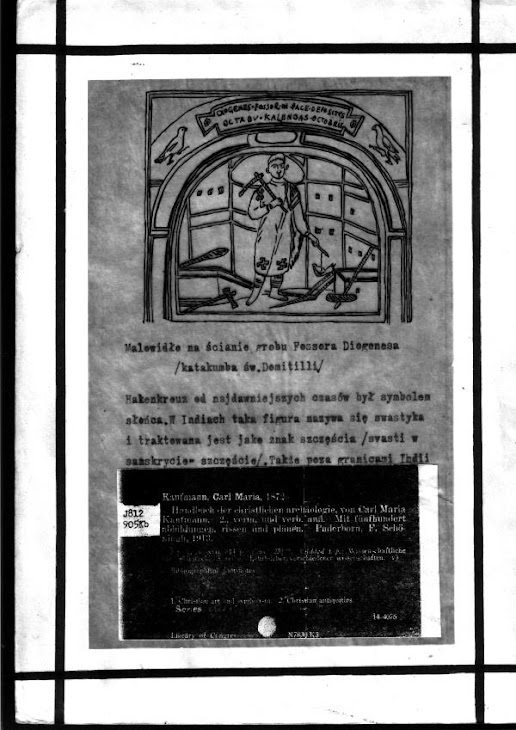
Notice the swastikas on his dress
Jerusalem The Old City


Tea Party

Swastika Koran

Gorbachev: Victory in Afghanistan is impossible

Former Soviet Union President Mikhail Gorbachev has said that NATO troops will never achieve victory in Afghanistan. The republic should be assisted in overcoming the aftermath of military operations, Gorbachev told Moscow-based BBC correspondent Steve Rosenberg. He also praised U.S. President Barack Obama for his decision to start withdrawing troops next year, adding that before the Soviet Union withdrew from Afghanistan, an agreement had been reached with Iran, India, Pakistan and the U.S., providing for Afghanistan’s becoming a neutral, democratic country
Deauville Summit Supports the Talks

Statue of Confucius, Father of Chinese geocentrism goes up in Russia
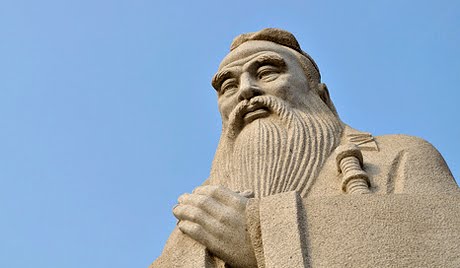
The ideal prince of China rules by moral force (te) contrasted with li “physical force”; he is compared to the “north polar-star, which remains in its place while all the lesser stars turn about it.”
Shimon Peres meets guests from China

Israel's President Shimon Peres (2nd R) receives a gift presented by Huang Huahua (3rd L), governor of south China's Guangdong Province, during their meeting in Jerusalem, Oct. 24, 2010. (Xinhua/Yi Dongxun)
the Ice Crystals of Auschwitz

Death Fugue

Anna Chapman, a Russian Spy receiving Top Honor

The Russian spies who were deported from the US in the biggest spy scandal since the Cold War have been awarded top state honours by Dmitry Medvedev, the Russian president.The awards were handed out at a Kremlin ceremony on Monday, less than four months after the exchange, Natalya Timakova, Medvedev’s spokeswoman, said. No television footage or pictures have so far been released of the ceremony. J. Pollar still languishing in US Jail. No mercy for Jews.
Al Turki in Bejing

Jia Qinglin (R), chairman of the National Committee of the Chinese People's Political Consultative Conference, talks with Abdullah Al-Turki (L), secretary-general of the Muslim World League in Beijing, capital of China, Oct. 14, 2010. Jia met with a delegation of the Muslim World League headed by Abdullah Al-Turki on Thursday. (Xinhua/Ma Zhancheng). More than 120 delegates from 18 religions gathered Sept. 24, 2003 in Kazakhstan’s political capital to condemn terrorism and lay the foundations of an organization they advertised as a diverse effort to reduce violent clashes between faiths around the world. Envoys who attended the conference included Sheikh Abdullah al-Turki, secretary of the Muslinm World League based in Mecca, Saudi Arabia, Yonah Metzger, Ashkenazic chief rabbi of Israel, Cardinal Josef Tomko of the Vatican. “Violence and terror can only come to an end if we promote religious values on a global scale,” Ayataollah Mahdi Hadavi, professor of Islamic law at Qum Seminary School and head of the Iranian delegation, told the conference. More than 120 delegates from 18 religions gathered Sept. 24, 2003 in Kazakhstan’s political capital to condemn terrorism and lay the foundations of an organization they advertised as a diverse effort to reduce violent clashes between faiths around the world. Envoys who attended the conference included Sheikh Abdullah al-Turki, secretary of the Muslinm World League based in Mecca, Saudi Arabia, Yonah Metzger, Ashkenazic chief rabbi of Israel, Cardinal Josef Tomko of the Vatican. “Violence and terror can only come to an end if we promote religious values on a global scale,” Ayataollah Mahdi Hadavi, professor of Islamic law at Qum Seminary School and head of the Iranian delegation, told the conference.


Chinese Vice Premier Hui Liangyu delivers addresses the opening ceremony of 2010 China (Ningxia) International Investment and Trade Fair and the First China-Arab States Economic and Trade Forum in Yinchuan, capital of northwest China's Ningxia Hui Autonomous Region, Sept. 26, 2010. (Xinhua/Liu Quanlong)

The Spider Net

JFK and W. von Braun, SS Major

In May 1961, Kennedy issued the challenge: "First I believe that this nation should commit itself to achieving the goal before this decade is out, of landing a man on the moon and returning him safely to the earth."
http://www.angloisrael.com/

In God We Trust - Tea Party

Tea Party on the Horizon

Give them an ultimatum Sept.16,2010

Syria has demanded that Israel agree in principle to relinquish the Golan before talks begin, a demand that Israel has rejected. Israeli leaders say Syria must ends its ties with Iran and with PA-based terrorist groups such as Hamas and Islamic Jihad. And the PA demands that Israel agree in principle to relinquish Judea and Samaria before talks begin. So what to talk about? Well, they want the whole Israel between the Jordan River and the Mediterranean Sea. And that's their idea of the “peace”
NYT Cartoon: Expect the worse


Goal of Science – Nobel Laureate in Physics, Steven Weinberg, stated: “Nothing has been more important in the history of science than the work of Darwin and Wallace”. He pointed out that “not only the planets but even life could be understood in this naturalistic way.” He added: “I personally feel that the teaching of modern science is corrosive of religious belief, and I'm all for that! One of the things that in fact has driven me in my life, is the feeling that this is one of the great social functions of science – to free people from superstition”. … “The Ten Commandments portray a deity who is self-centered, selfish, jealous, obsessed with his own importance; this is not a nice kind of person. The traditional teachings of religion are, from the point of view of the morality most people share today, pretty immoral”

Here are some further quotations from Peter Singer from his books Rethinking Life and Death and Writings on an Ethical Life.On how mothers should be permitted to kill their offspring until the age of 28 days: "My colleague Helga Kuhse and I suggest that a period of twenty-eight days after birth might be allowed before an infant is accepted as having the same right to life as others." Brahmins also treat their own children as untouchable. Brahmin mothers dont touch their own children and brahmin mothers also dont love their children. What a horrible people these brahmins are.




Burka

When have American academics and theatre people last refused to travel to, buy products from, or lecture, appear in performance in Jordan (clothing, manufactured goods), Egypt (oil, textiles, cotton), Saudi Arabia (oil), Turkey (oil, metals, textiles, manufactured goods) or Pakistan (textiles, manufactured goods)? Surely the human rights records of these countries cry out for free people of goodwill to do just that in response to the large number of honor-related crimes, including honor killings, the forced veiling of women, persecution of Christians and other infidels, the torture and imprisonment of artists and dissidents, the non-stop Islamist terrorist attacks against Muslims, and the “manufacture” and distribution of the most vicious propaganda against Israel and America.

Martyrs Brigaes in action

NEW DELHI — Kashmir erupted on Monday in the worst violence since separatist protests began sweeping through the disputed Himalayan region three months ago, with authorities partly blaming the inflamed tensions on televised reports of Koran desecration in the United States. The bloodshed, which came as Indian leaders were searching for a way out of the Kashmir crisis, left at least 14 civilians and two security officers dead and at least 60 people injured in clashes across the region, authorities said. In one town, Tangmarg, authorities said officers opened fire after protesters had set a school and other government buildings ablaze.
German Award for the Muhammad Cartoonist

Danish cartoonist Kurt Westergaard (left) is congratulated on his prize by German Chancellor Angela Merkel (right) and Joachim Gauck, a former human rights activist in East Germany, during the award ceremony Wednesday.
+chief+of+general+Staff+of+PLA+meets+with+defense+minister+and+chief+of+staff+of+Kazakhstan.jpg)
Chen Bingde (R), chief of the General Staff of the Chinese People's Liberation Army, meets with Saken Zhasuzakov, first deputy defense minister and chief of the staff of Kazakhstan's Armed Forces, in Almaty, Kazakhstan, Sept. 9, 2010. Chen visited Almaty on Thursday to attend the opening ceremony of the "Peace Mission - 2010" anti-terrorism military exercise, which is launched under the framework of the Shanghai Cooperation Organization in south Kazakhstan from Sept. 9 to 25. (Xinhua/Wang Jianmin)



U.S. President Barack Obama (R) greets Palestinian President Mahmoud Abbas (L) and Israeli Prime Minister Benjamin Netanyahu, as leaders gathered to deliver a joint statement on Middle East Peace talks in the East Room of the White House in Washington September 1, 2010.
Abbas resembling Einstein

By December 1948, a distinguished contingent of Jewish scientists and intellectuals warned in The New York Times that those leading the effort to establish a Jewish state bear "the unmistakable stamp of a Fascist party". Albert Einstein joined concerned Jews who cautioned Americans "not to support this latest manifestation of fascism. "The undersigned therefore take this means of publicly presenting a few salient facts concerning Begin and his party, and of urging all concerned not to support this latest manifestation of fascism." Albert Einstein, The New York Times, 4 December 1948

Glenn Beck Rally: America Turning Back to God "Something beyond imagination is happening," he said. "America today begins to turn back to God."The crowd — organizers had a permit for 300,000 — was a sea of people standing shoulder to shoulder across large expanses of the Mall. It was not clear how many tea party activists were in the crowd, but the sheer size of the turnout helped demonstrate the size and potential national influence of the movement. Activists distributed fliers urging voters "dump Obama." The pamphlet included a picture of the president with a Hitler-style mustache.

The Polish delegate to the UN, Drohojewski said on May 11, 1949: “It was not long since the British Foreign Office had tried and failed to prevent the creation of Israel. United Kingdom and US diplomacy had been ready to betray the new State before its birth. The US Government’s change of policy with regard to Israel had occurred for reasons of political expediency divorced from any sense of justice or faith in Israel’s future. That should not be forgotten…”

It doesn’t require being at the head of the class in Politics 101 to know that meetings in Washington to establish a peace between Israel and Palestine is a desperate and cynical attempt by the Obama administration to divert attention from his collapsing political fortunes at home.

Palestinian attacks on Israelis in the West Bank were masterminded by aggressive extremists and are designed to disrupt the peace talks. A statement to that effect was made by the UN Secretary-General Ban Ki-moon in an interview published by the Austrian ‘Der Standard’. Ban Ki-moon urged all parties concerned to support the negotiating process and called for extending a moratorium on the building of Israeli settlements in the West Bank. The Palestinians, he said, ought to signal readiness for talks too.
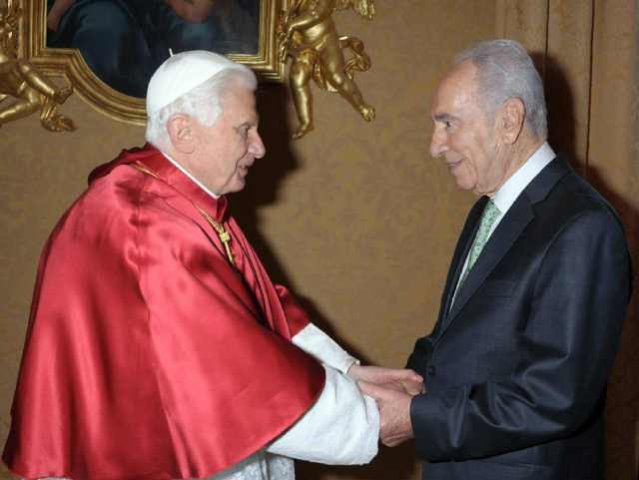
Elul 23, 5770, 02 September 10 08:12, by Maayana Miskin (Israelnationalnews.com) President Shimon Peres plans to meet Thursday with Pope Benedict XVI in Italy. The two are to discuss the peace talks between Israel and the Palestinian Authority. In addition, the two will talk about captive Israeli soldier Gilad Shalit, Iran's nuclear program, and ties between Israel and the Vatican. Peres met Wednesday with Gilad Shalit's parents, Noam and Aviva, in advance of his meeting with the Pope. “We must never lose hope, we must continue to fight for Gilad's return,” he said. Shalit's parents have led a campaign to bring their son home even at the expense of releasing many hundreds of convicted terrorists, including those responsible for multiple murders. Peres praised the two for their struggle, saying, “I am proud of the noble way in which you are struggling to bring back your son Gilad, and I am proud of the Israeli public for standing at your side.” Shalit's parents asked the president to use his influence to push for Gilad's release. After meeting with the Pope, Peres plans to remain in Italy over the weekend to attend an economic and diplomatic conference and to defend Israel in the media. www.IsraelNationalNews.com
Bushehr nuclear power plant

Iran Inaugurates its first bombing drone


He replaced his nondescript hair style and handlebar mustache with the hanging forelock and brush mustache that he copied from a painting of Wotan. The painting “The Wild Chase,” is of the genre depicting Wotan as a figure of terror in a frenzy of action. Wotan’s assistants are a pack of killer wolves. During WWII, Hitler called one of his command posts the Wolf’s Lair, another the Wolf’s Gorge, and still another the Werewolf. He called young members of the Hitler Youth “wolf cubs” (recall that the figures of Romulus and Remus were added to the Roman she-wolf in the Renaissance period, when the Church organized the Jesuit Order) and the SS “my pack of wolves.” The Latin lupa means also a whore, and lupanar is brothel. St. Thomas Aquinas considered it necessary for every town to set up a brothel. The party organ of the Nazis was the pornographic Der Stuermer.
Russian 1800 Engraving dpicting the Whore of babylon, Riding the seven-headed monster
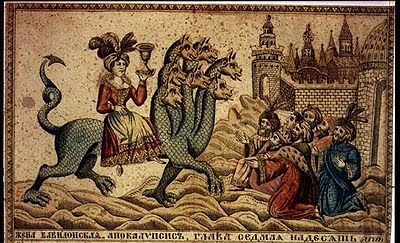
(Cp. the Quartet
William Blake, The Whore of Babylon

Siege and destruction of Jerusalem

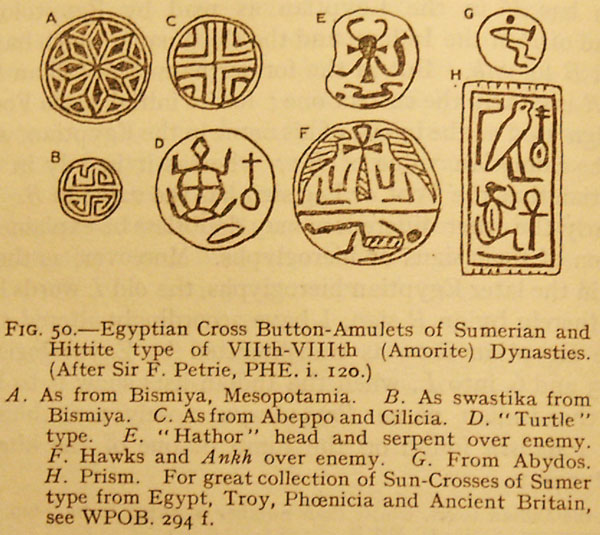


J. Pollard on Jerusalem Wall

Pacaya Volcano
No comments:
Post a Comment